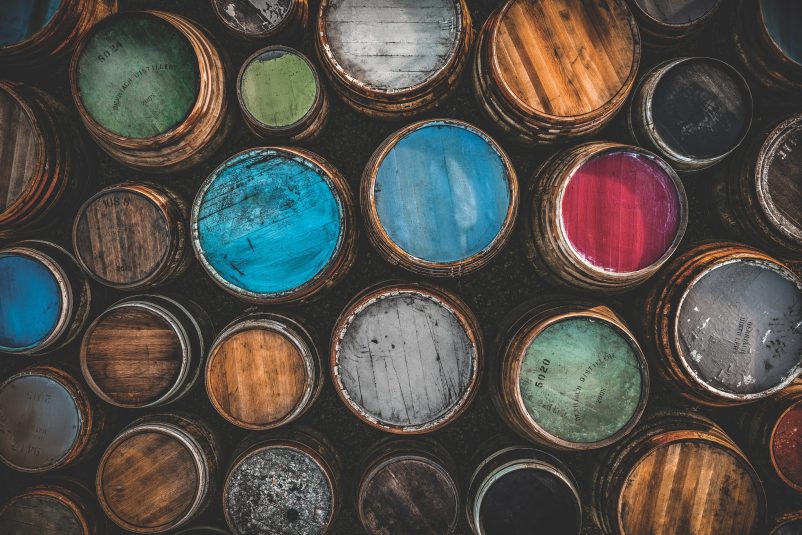As 2020 comes to a close, no other gift is better equipped to help you forget the year that was than a bottle of distilled agave.
Had this year been like just about any year before it, right about now—at least for those of us who live north of the Mason-Dixon line—many of us would be looking forward to the holidays ahead and then, shortly thereafter, embarking on a customary mid-winter escape to locations both balmy and tropical. Mexico, the Caribbean, Central America, maybe even Brazil would be calling.
But with this being the sui generis year that it is—one over which historians of the future will endlessly marvel—many of us have already decamped to our favorite warm weather locations to wait out the pandemic, while others of us have opted to stay home in colder climates, foregoing any travel this year for precisely the same reasons.

Whether you are already in your favorite holiday locale, planning on traveling southward soon or just wanting to bring a little extra beach vibe to your wintery home for the holidays, Worth has just what you need to carry you and your friends through the next few months—the ultimate list of the best bottles of tequila, mezcal and other libations made from distilled agave. Whether it’s a gift to yourself or for a loved one, these are the ultimate must-have agave-based spirits to lift up our collective spirits at a time when the Ghost of Christmas Present is not as festive as he has been in years past.
The DOs and Don’ts of Agave-Based Spirits
Before we get to our list, it’s worth going over some agave basics. When dealing with tequila, mezcal, avila and other agave-based spirits, it’s important to pay attention to each product’s DO, a Spanish acronym for denominación de origen, or appellation—a guide to where the original agave plant was cultivated and harvested. Like Champagne, Burgundy, Chianti and Rioja, Tequila is the name of a specific region where the Blue Agave plant is grown. Traditionally, tequila hails from the highlands of the Mexican state of Jalisco (specifically near the town of Tequila), but Mexican laws, bending to enormous foreign demand—principally from the U.S.—have broadened the official tequila producing areas in recent years to include certain areas in the neighboring states of Guanajuato, Michoacán and Nayarit, as well as in the state of Tamaulipas, on the Gulf Coast.
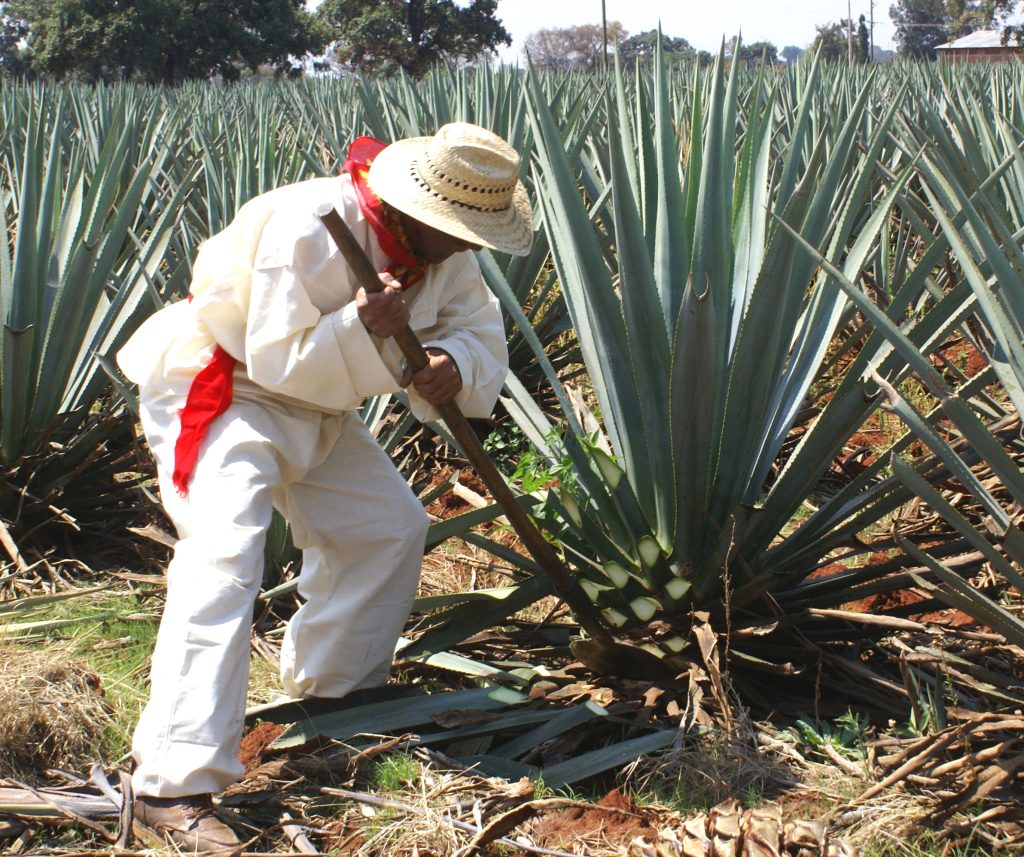
Tequila
All tequilas have a four-digit number that represents each distillery’s unique code. The Norma Oficial Mexicana number (or NOM) is assigned by the Mexican government and certifies the authenticity of the tequila. It also indicates the name of the tequila producer. Tequila Patrón, for example, has a NOM of 1492. If your bottle doesn’t have a NOM, that means it’s not certified by the TRC (Tequila Regulatory Council) and not an authentic tequila producer.

Hundreds of different varieties of agave grow throughout Mexico (and across the border in California, Arizona, New Mexico and Texas), but only one, the Blue Weber agave plant, cultivated in certain areas designated by Mexican regulatory authorities, may be used to distill tequila. A 1970s-era Mexican law requires anyone determined to brand their agave reduction as a “tequila” must use the Blue Weber varietal and follow specific methods for tequila production.
The Blue Weber agave strand has something of an interesting backstory. It’s named after Franz Weber, a German naturalist and the first European to classify the specific agave species, but the history of the plant, the agave tequilana, goes back to the beginning of the Colombian Exchange. According to tequila industry lore, in the 1500s, thirsty Spaniards, longing for their Riojas and Tempranillos from home, created the first agave distillate—something they called vino mezcal, or mezcal wine, from the fermented juice that the Mexican natives drank. As the process gained popularity, it soon became widely accepted that the tastiest take of this New World libation was the version produced around the small town of Tequila in the Jalisco highlands of central Mexico. This particular distillate, called vino mezcal de Tequila, soon became known simply as “tequila.” Fast forward several hundred years to 2020 and tequila, the alcoholic foundation of America’s most popular cocktail, the margarita, is a multibillion-dollar export business for Mexico.
Mezcal
Historically considered the poor man’s tequila (although that trend has reversed itself in the past decade), mezcal can be made from about 30 of the 200 or so sub-species of the agave plant. Although Mexican regulators now allow mezcal to be produced in certain areas in nine different Mexican states, Oaxaca is still considered its historical production epicenter.
Speaking of mezcal, we must address the question we know everyone wants to know: What’s up with that worm in the bottom of some bottles of mezcal? These days, most premium mezcal doesn’t contain a worm, but the invertebrate sloshing around in the bottom of mezcal bottles remains something of a cultural icon.
The “worm” that many associate with mezcal is not actually a worm, but a baby larva of a species of moth that lives in the agave. According to local folklore, the tradition of inserting the larvae in mezcal began when a craftsman found a nest of these little bugs and, after sticking one in a bottle, he came to believe that it not only improved the taste but would also be a great marketing ploy.
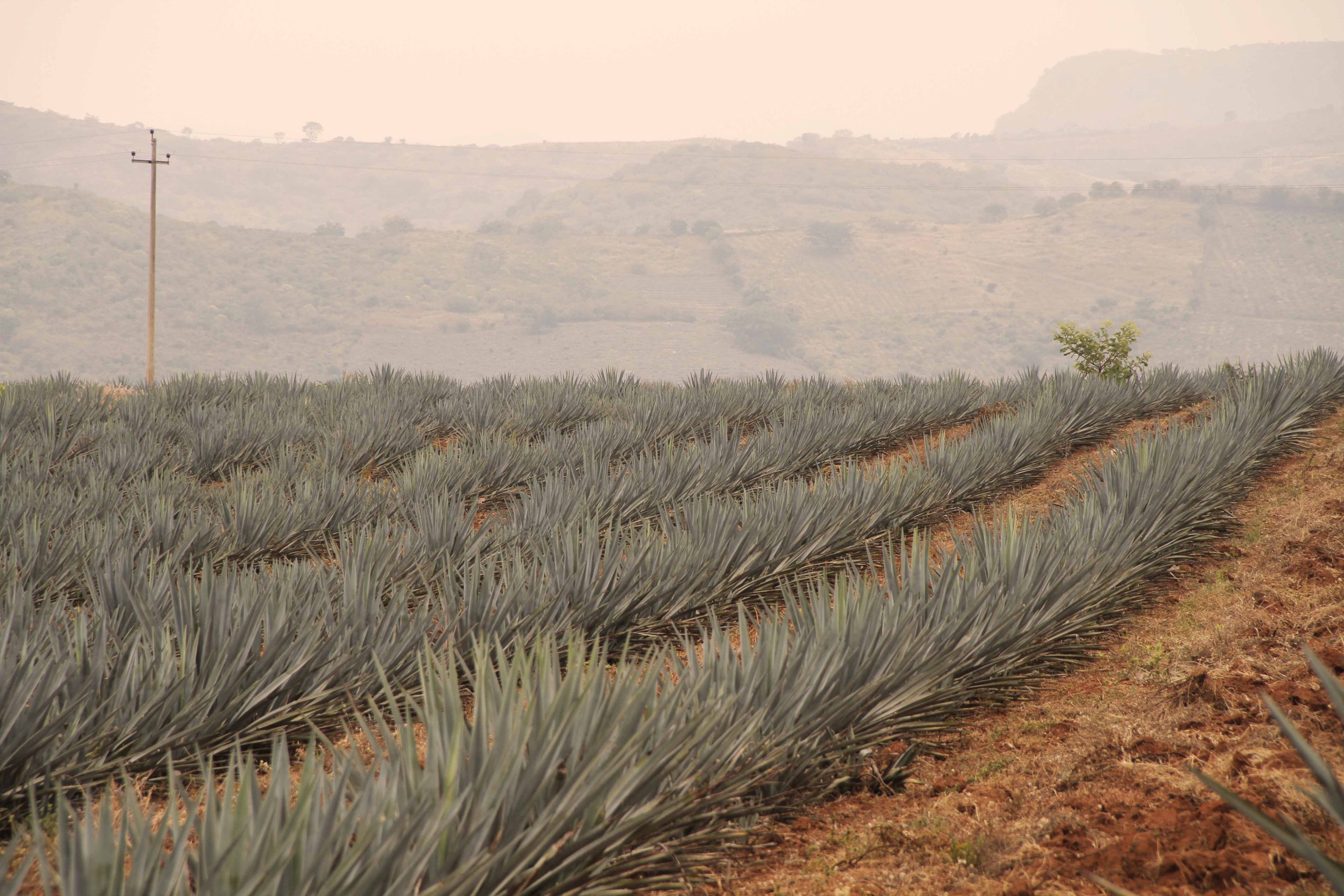
Tequila vs. Mezcal
But location and worms are not the only differences between tequila and mezcal. Perhaps the best way to distinguish between the two is to draw an analogy to the world of whiskey (or whisky with no ‘e’). Tequila is a type of mezcal, much like how scotch and bourbon are both types of whiskey. Most common agave-based spirits start off with the same raw materials—the inner fruit of the agave plant, known as the piña; however, that’s where the similarities in production end.
Tequila is produced by steaming the agave inside ovens before being distilled two (or in some cases, three or more) times in copper pots. Mezcal follows a much more traditional route on its way to a bottle near you. First the piña is cooked inside big earthen pits, lined with volcanic rocks and filled with wood and charcoal, before being distilled in clay pots. This is the process that gives most types of mezcal the distinct smokiness that differentiates it from tequila.
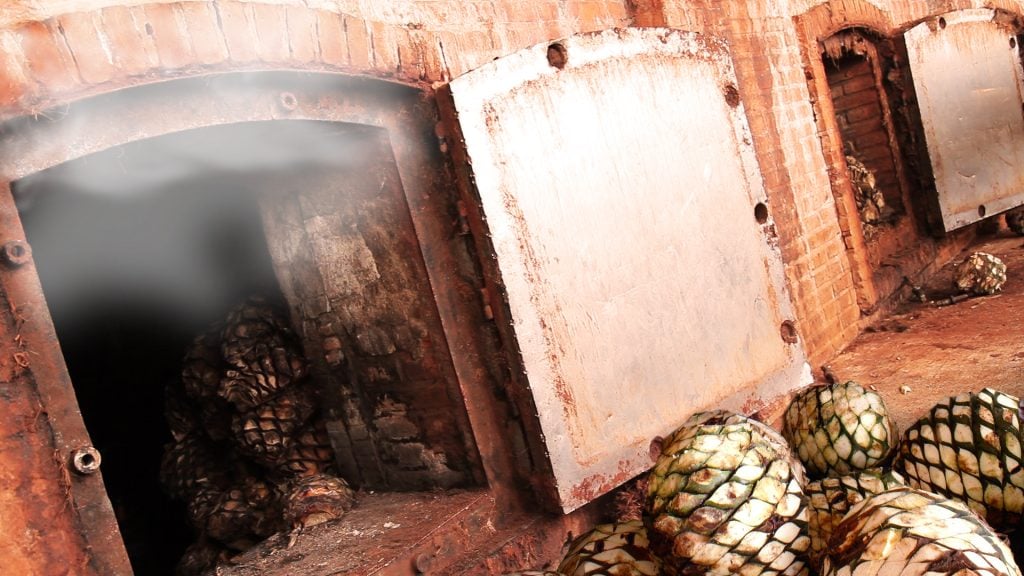
Other Agave Spirits
Avila is another agave spirit that has grown in popularity in recent years. Hailing from the state of Morelos, avila is neither tequila nor mezcal, but combines production techniques from both. The jimadores—the Mexican agave farmers—harvest piñas and then roast them as is done in typical mezcal production, and then steam them as they are done with tequila. Avila is generally distilled three times before being barreled for the aging process.
In 2019, Mexico exported 350 million liters of tequila and another 70 million liters of mezcal. Sotol, raicilla and bacanora are other up and coming agave-based spirits that agave-insiders feel have a fighting chance of carving out their own piece of the multi-billion-dollar Mexican agave spirits exports market.
Given almost limitless demand for agave-based spirits, some entrepreneurially minded gringos across the border have begun looking to get in on the agave action. From Texas to California, a nascent agave spirits industry is underfoot. Ventura Spirits, for example, is a California-based craft distillery that has been growing and harvesting its own agave. If demand for tequila and mezcal continue to skyrocket, perhaps it won’t be too long before we are sipping entire shelves worth of U.S.-grown tequila knockoffs.
Appellation aside, there are a few other basic things that are worth understanding when it comes to the world of agave-based spirits before we dive headfirst into our list; the most important of these is the aging process, which leads to notable differences in flavor, color and potency.
Just like any fine wine, tequila, mezcal, avila and other agave extracts go through an aging process. And just as it is in enology, tequila is aged in an array of different type of containers, from repurposed oak scotch barrels to steel or copper drums. Each aging process brings out different flavors in the agave, resulting in a unique nose and distinct flavor profiles that also affect the hue of the liquid. A clear tequila usually means it was aged for only a few months and possibly in a metal container, while rich honey or golden hues suggested more time aging in wooden barrels.
Silver, Blanco and Plata
Silver (often branded as blanco or plata) mezcal or tequila is probably the most well-known, and it typically appears perfectly clear in the bottle. It has only aged for a few months, so it doesn’t have time to develop the color and characteristics that come from a longer aging process. Silver distilled agave is great to drink on its own, but it’s great for mixed drinks as well. It will typically taste sweeter and more refreshing, with a smooth, silky finish.
Reposado
Reposado is also aged, but the aging process can be anywhere from two months to 11 months. It has a smooth, even finish. It’s less harsh on the tongue and won’t give you as strong of a hangover—provided that you’re sipping responsibly, of course.
Añejo
Añejo agave spirits can often be recognized by their rich, caramel colors, and it must be aged for at least one year (though most are aged three years) to bear the “Añejo” name. This type of tequila is complex and full-bodied, and is recommended for sipping, though it works great for tequila-oriented takes on classic drinks like a Moscow Mule or Negroni as well. Extra Añejo usually means that the aging process is even longer—for five or sometimes 10 years or more.
Fool’s Gold
Probably due to the popularity of entry-level tequila brand José Cuervo Gold—a favorite in college dorm rooms and open-bar holiday office parties—many casual drinkers might erroneously be under the impression that the “gold” designation confers some sort of premium quality. The gold or oro label is shorthand for mixto—a blend of both blanco, reposado and other non-agave ingredients, including gold coloring—part of the reason why just a few margaritas mixed with gold mezcal or tequila often leaves the imbiber with a nasty hangover the next day. In general, it’s always better to look for bottles labeled “100 percent agave,” which denotes that it was made with 100 percent natural sugars from the agave plant.
One possible exception to the 100 percent rule might be flavored tequilas—although we are partial to in vitro flavoring (i.e., adding natural flavors at the moment the drink is mixed and poured). In the list below, we include two specific flavored tequila brands that we feel are worth buying: jalapeño and ghost pepper, because the distillers in each case did a pretty good job with adding some additional fire and pepper to the tequila elixir.
The Tequila Bottle
The role of the bottle has changed with the expanding landscape of the tequila and mezcal industry. Its function has evolved dramatically; once it was a mere vessel utilized to hold liquor, but times have changed, and the bottle is now an essential piece of every brand’s marketing. The bottle represents an opportunity for tequila craftsman to mark their identity and stand out on top-shelves in homes and bars around the world.
Take the Tequila Ley .925 Diamante, AKA the “Diamond Law.” One would think the diamond-studded dragon emblazoned on the bottle would be guarding an equally valuable treasure from within. Pop that platinum studded cork off, however, and you’re greeted by a liquid concoction that on its best days would run you a couple hundred dollars over the counter and not the incredible $3.5 million valuation that has been ascribed to the bottle.
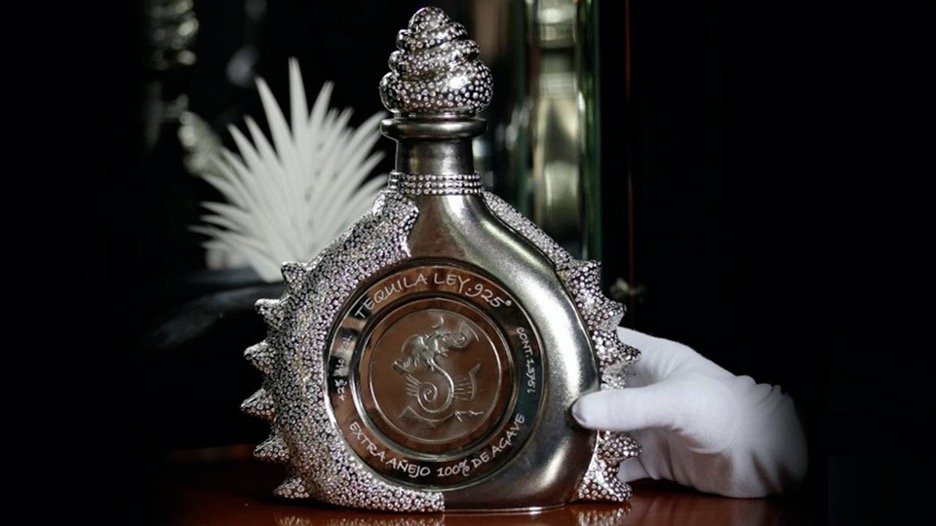
Finally, we can’t talk about agave spirits without mentioning a new genre, best described as the “celebrity tequila.” Back in 2017, George Clooney and his business partner Rande Gerber (AKA Mr. Cindy Crawford) sold their tequila company Casamigos for a cool $1 billion to British beverage conglomerate Diageo. Since then, it seems, the market has become flooded with tequila companies run by or started by huge stars like Dwayne Johnson, Michael Jordan and Aaron Paul and Bryan Cranston. Even B-list celebrities, like Sex and the City’s Chris Noth (Mr. Big), are getting in on the action. But don’t let Hollywood endorsements turn you off—when it comes to choosing a tequila, there should be no shame in picking a bottle that has your favorite star’s name plastered on the front, as more often than not these companies are built out of love for the drink rather than the cash.
Now, without further ado, whether traveling to balmy destinations or staying put, whether for your home bar or for a gift to a friend or loved one, here is Worth’s list of the 29 agave-based spirits you should get your hands on this holiday season.
1. Clase Azul Ultra Tequila
Retail Price: $1,599.99 / 750mL
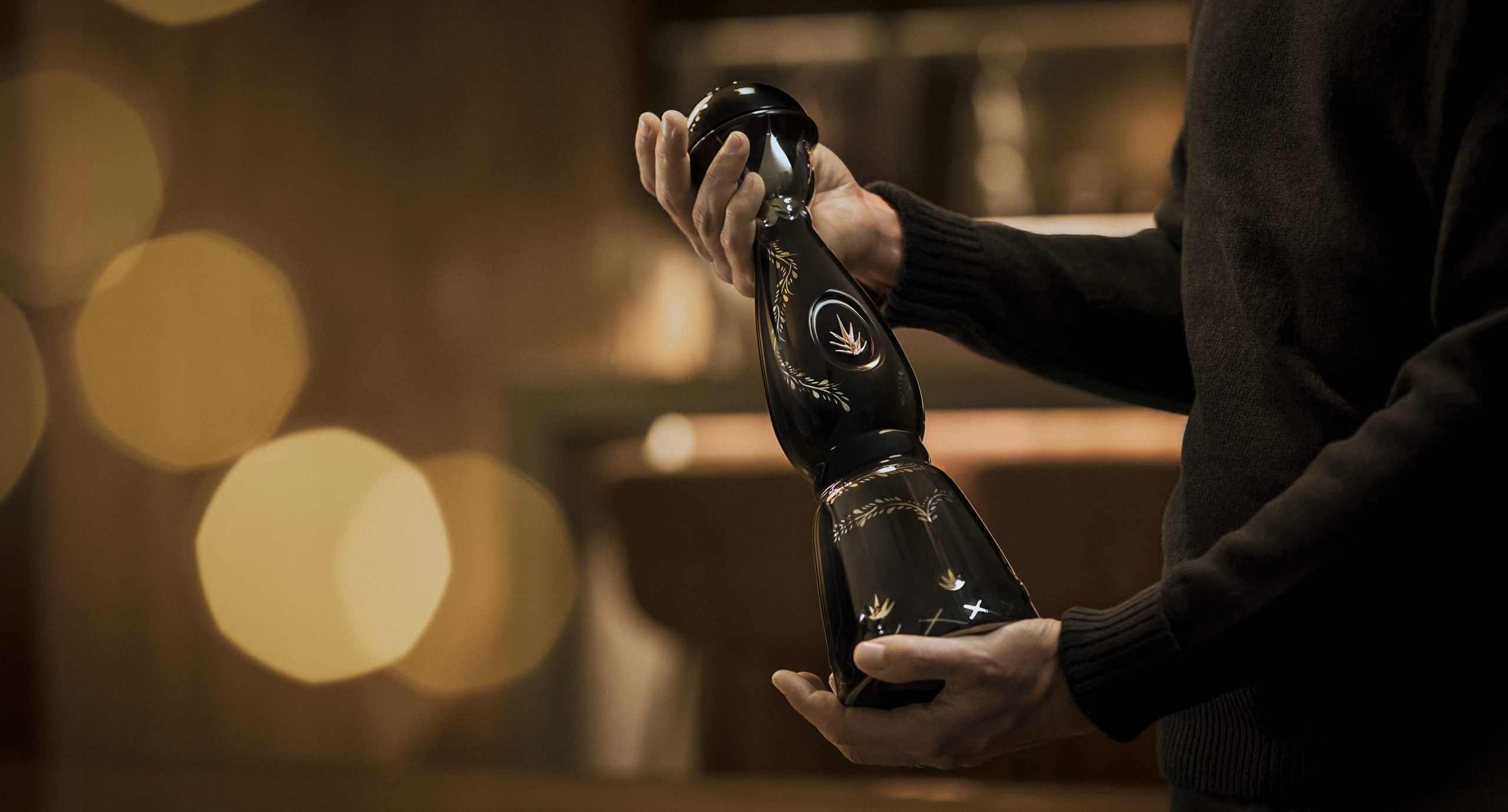
From the superior tequila to the unique and beautifully handcrafted bottles, Clase Azul Ultra is our number one pick for the best tequila to have on hand during the holidays. One hundred percent authentic in every way, the Clase Azul brand hails from the small Mexican town of Santa Maria Canchesda and has become an international symbol of excellence in the agave spirits category. What sets Clase Azul apart from other top-notch tequilas are the bottles—literal pieces of handcrafted art. Over 100 artisans dedicate many hours to creating each bottle, one at a time.
Inside the bottle, you will encounter an agave extract made from 100 percent organic Blue Weber agave, produced in one of the highest points in Los Altos, or the highlands—in the town of Jesus Maria in the Jalisco region—resulting in a unique flavor profile that makes it worth every penny and every drop.
2. Lobos 1707 Tequila Extra Añejo
Retail Price: $149.00 / 750mL
Lobos 1707 Tequila Extra Añejo is a top-tier sipping tequila. Backed by NBA superstar LeBron James, who was attracted to the brand’s mission of “celebrating the strength of group…of shared passion and value,” Lobos 1707’s Extra Añejo tequila is one of the newer brands to make our list. But don’t let its 2020 release date make you think this blue agave is any bit green. Named after the Spanish word for wolves and dedicated to “celebrating the strength of the pack,” this company is already running with the big dogs.
The Extra Añejo spends three years in American white oak barrels before finishing in the historic Pedro Ximénez (PX) wine barrels using the solera system method. Hints of sweet citrus, aging wood, and marked vinous tobacco, with lingering hints of coffee and cocoa, accompany every sip.
3. Mezcal Clase Azul
Retail Price: $458.00 / 750 mL
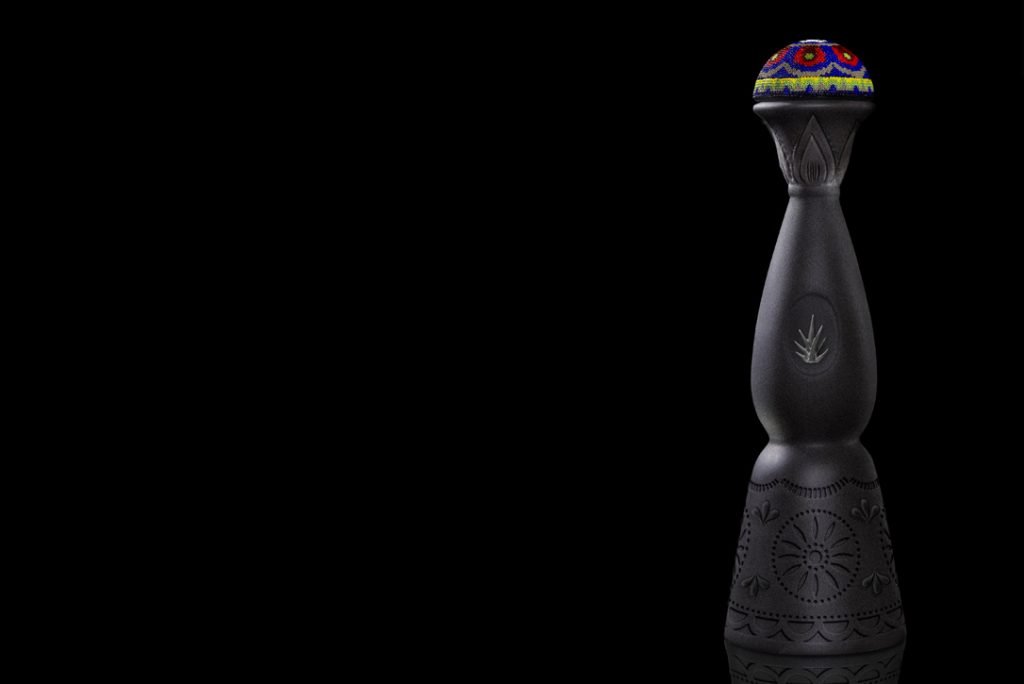
We can say without a doubt that Mezcal Clase Azul is the top-in-class sipping mezcal you will find on this list. Like all Clase Azul products, the bottles are pieces of art that retain value long after you have emptied the last drop. Its black matte decanters are all individually decorated with images from Mazahua, Wixárika and Huichol culture. Even if sipping this mezcal by yourself, you will never feel alone as you stare at the bottle’s curvaceous, pitch black body.
The Mezcal Clase Azul is created using 100 percent Cenizo agave, which grows wild in the state of Durango. The region—known for extreme climate, mineral-rich soil and local natural springs—contributes to a complex profile that alters the flavor into something you would be hard-pressed to find anywhere else in the world. An underground baking process produces sweet notes of peanut, brown sugar, honey, ash, wood and chocolate. Drink neat or pour over clear ice.
4. Tanteo Jalapeño
Retail Price: $42.99 / 750mL
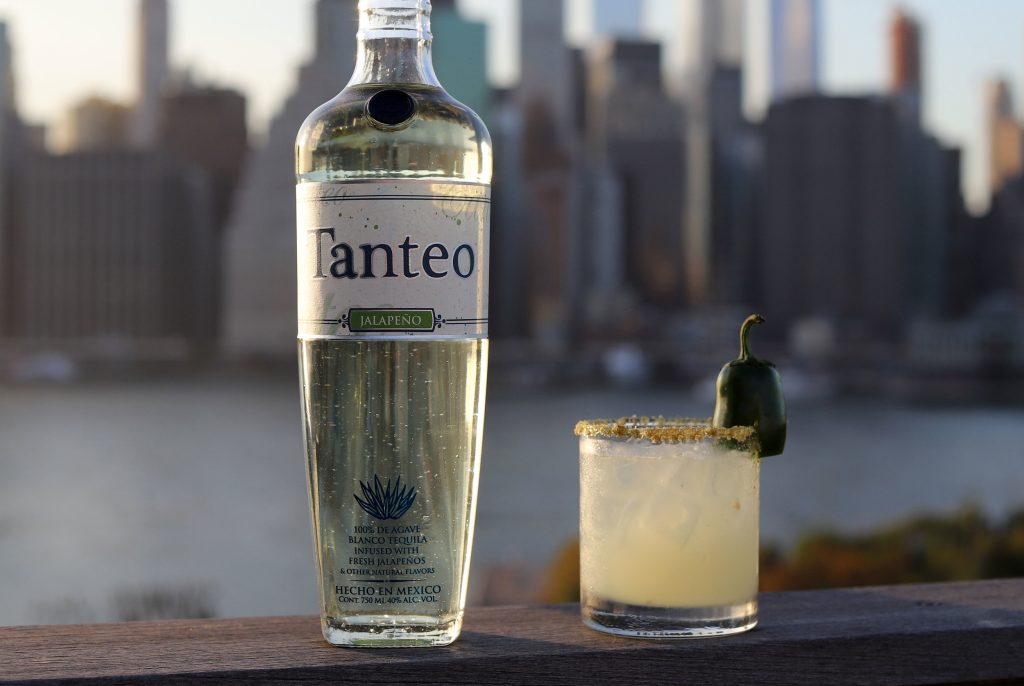
Some agave purists might scoff at the idea of a flavored tequila—especially when it retails for less than $50—but after trying the Tanteo Jalapeño Tequila, they very well might change their minds; it really puts other flavored tequilas to shame.
Tanteo infuses its tequila with jalapeños, instead of the more common maceration process that is used to add flavor to spirits. The result is a subtle yet distinct bite that hints at a sweet citrus flavor which juxtaposes beautifully with a peppery, dry finish.
5. Revel Avila Reposado
Retail Price: $72.99 / 750mL
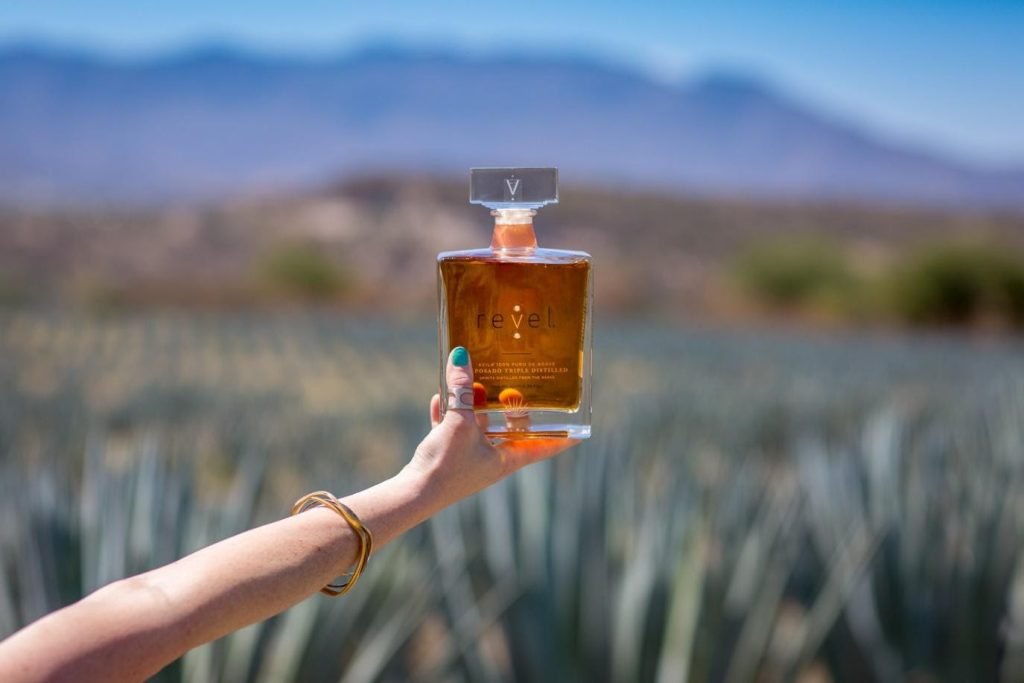
Tequila and mezcal are officially on notice; there is a new player in town. Like tequila, the Revel Avila 100% Puro Agave is a likely candidate for the most interesting agave spirit on this list. While having the same foundation as tequila, avila represents an entirely new category in the agave spirits world. What distinguishes avila from tequila and mezcal is its providence. Avila is produced exclusively in the state of Morelos, Mexico by a group of families who have perfected their distillation processes. We think it’s definitely worth a try. Revel’s Reposado is our choice for diving into the world of avila, but the blanco and the añejo also deserve a tasting.
Critics have warmly welcomed Revel Avila, having bestowed numerous gold, silver and bronze medals in competitions, such as the San Francisco International Spirits Competition, SIP Awards, LA International Spirits Competition and New York International Spirits Competition.
6. Qui Rare Extra Añejo
Retail Price: $399 / 750mL
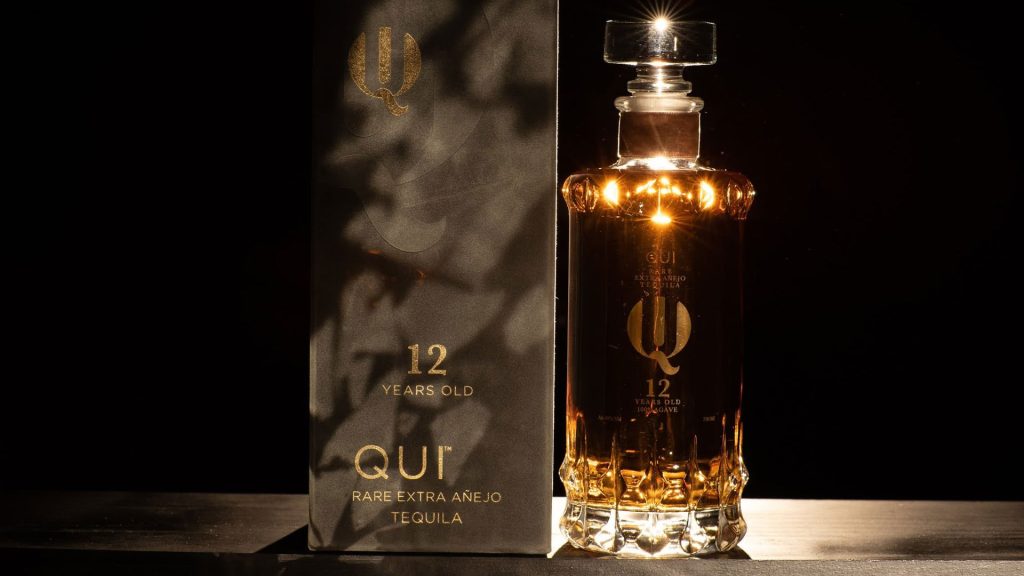
Qui Rare Extra Añejo is a beautifully distinct tequila that is a must-have for anyone who can appreciate precision in liquid agave craftsmanship. Using 100 percent blue agave sourced in the highest regions of the Los Altos, each batch of Qui Rare Extra Añejo has a sui generis distillation process. The distillate produced lacks what industry insiders call the “tail”—a special process that is oftentimes added to tequila by distillers to achieve a smokier taste. The complete lack of a tail is why the Qui Rare Extra Añejo finishes with such a buttery, creamy texture that sports aromas of caramel, vanilla and sweet oak.
7. Herradura Selección Suprema Tequila
Retail Price: $359.99 / 750 mL
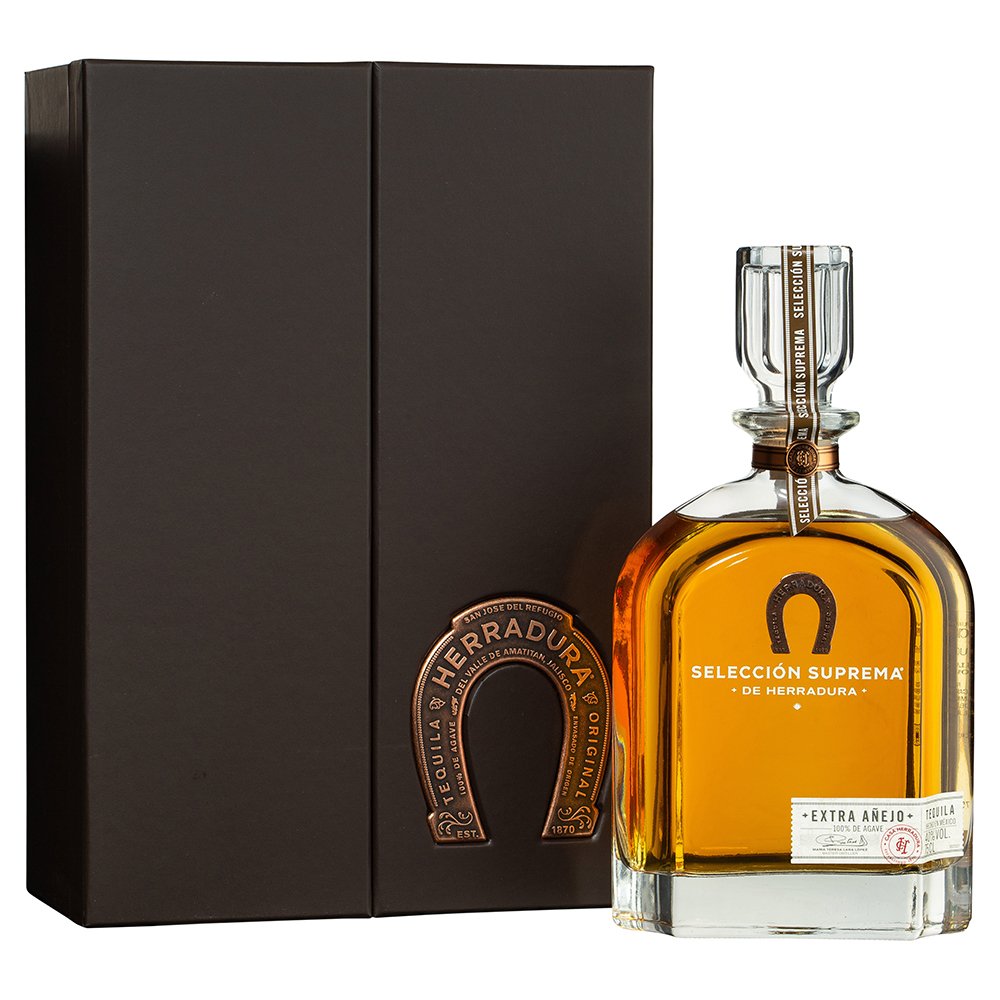
The Herradura Selección Suprema Tequila is the perfect sipping tequila for those big moments in life. This iconic tequila company sources its Blue Weber agave from the volcanic lowland regions around the Amatitián municipality, giving the Suprema Tequila its distinctive herbaceous features. During the fermentation period, over 16 different species of fruit trees provide the different strains of yeast that give this sipping tequila a one-of-a-kind flavor profile. After aging for 49 months in American white oak barrels, it’s ready to be sampled. The Herradura Selección Suprema Tequila is not cheap but should be considered a staple drink in any home bar worth its salt.
8. Tears of Llorona No. 3 Extra Añejo Tequila
Retail Price: $219.99 / 750mL
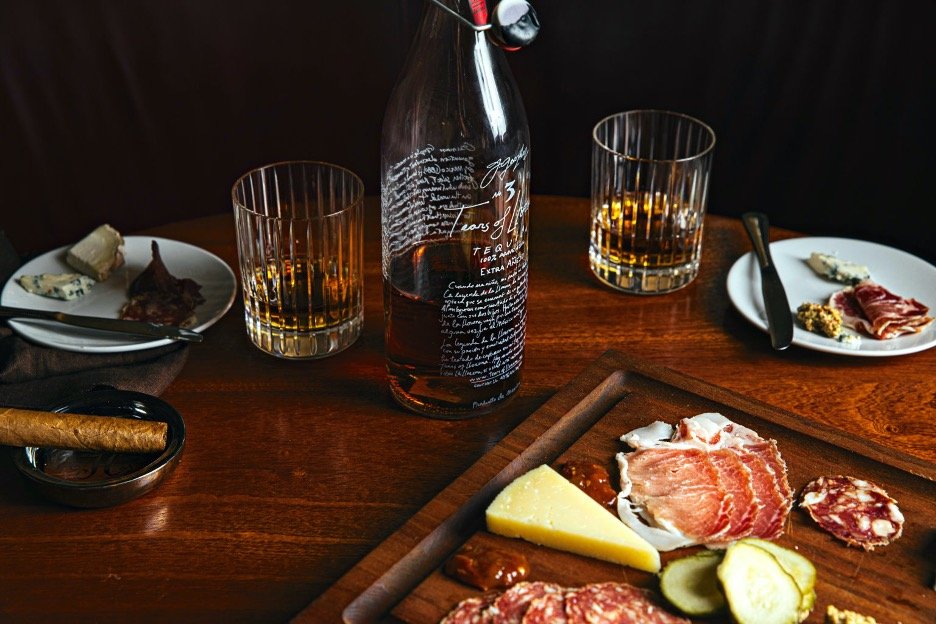
Tears of Llorona No. 3 Extra Añejo Tequila is something to behold. Sourced in the volcanic soil surrounding Atotonilco in the highlands of Jalisco, Tears of Llorona’s Blue Weber agave hearts are slow roasted and shredded into aguamiel, a viscous honey-like dew, which is then fermented with a proprietary strain of yeast before being twice distilled through copper pot stills. Unlike most tequilas, half of each Tears of Llorona batch is aged in scotch barrels, a quarter in sherry casks and another quarter in cognac barrels—all for five years before being mixed together.
Its namesake is based on a Mexican lore that Tears of Llorona founder German Gonzalez heard as a young man. La Llorona, or “The Weeping Lady,” is a Mexican legend that tells of an Aztec princess who was abandoned by a Spanish conquistador with whom she had fallen madly in love; blinded by her grief, she drowned her children and then herself. Fortunately for imbibers of Tears of Llorona No. 3 Extra Añejo Tequila, there is no reason for sorrow; quite the opposite, as every sip will bring a smile to your face, no matter how discerning a palate you might have. The differently aged tequilas melodiously combine their aromatic notes to compose a sweet song of black cherries, vanilla, honeysuckle and apples. Its flavor profile is a rush of sweet chocolate and toffee that finishes with spiced notes of cinnamon, caramel and oak. You can’t go wrong with this one.
9. El Nivel Ghost Pepper
Retail Price: $54.95 / 750mL
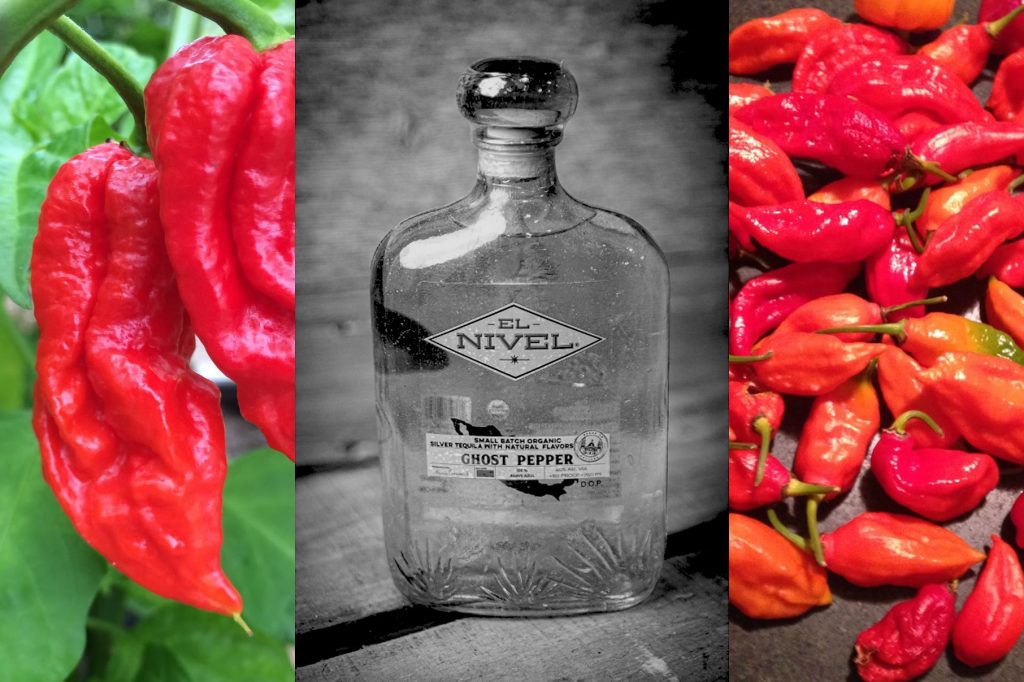
We’re not sure if the makers of El Nivel have a wry sense of humor, but their marketing materials tout their ghost pepper-flavored tequila as “designed to reflect the flavors of Mexican candy—a little sweet, a little spicy.” We know we didn’t grow up sucking on ghost peppers, but to each his own; this is not your father’s Jolly Rancher.
Either way, El Nivel Ghost Pepper is perfect for the tequila lover who thinks they’ve tasted it all. The agave grows on historic archaeological sites just outside of Unión de Tula, Jalisco, where agave has been growing for hundreds of years. Worth taste-testers felt the Ghost Pepper varietal was best appreciated over ice, but feel free to enjoy it straight as well if you are feeling particularly adventurous. On an inhale, sweet deep notes of fresh agave burst out of the bottle, giving way to a deliciously smooth, rich and, quite frankly, creamy taste profile with a big bite that lingers.
10. Dulce Vida Reposado
Retail Price: $43.97 / 375mL
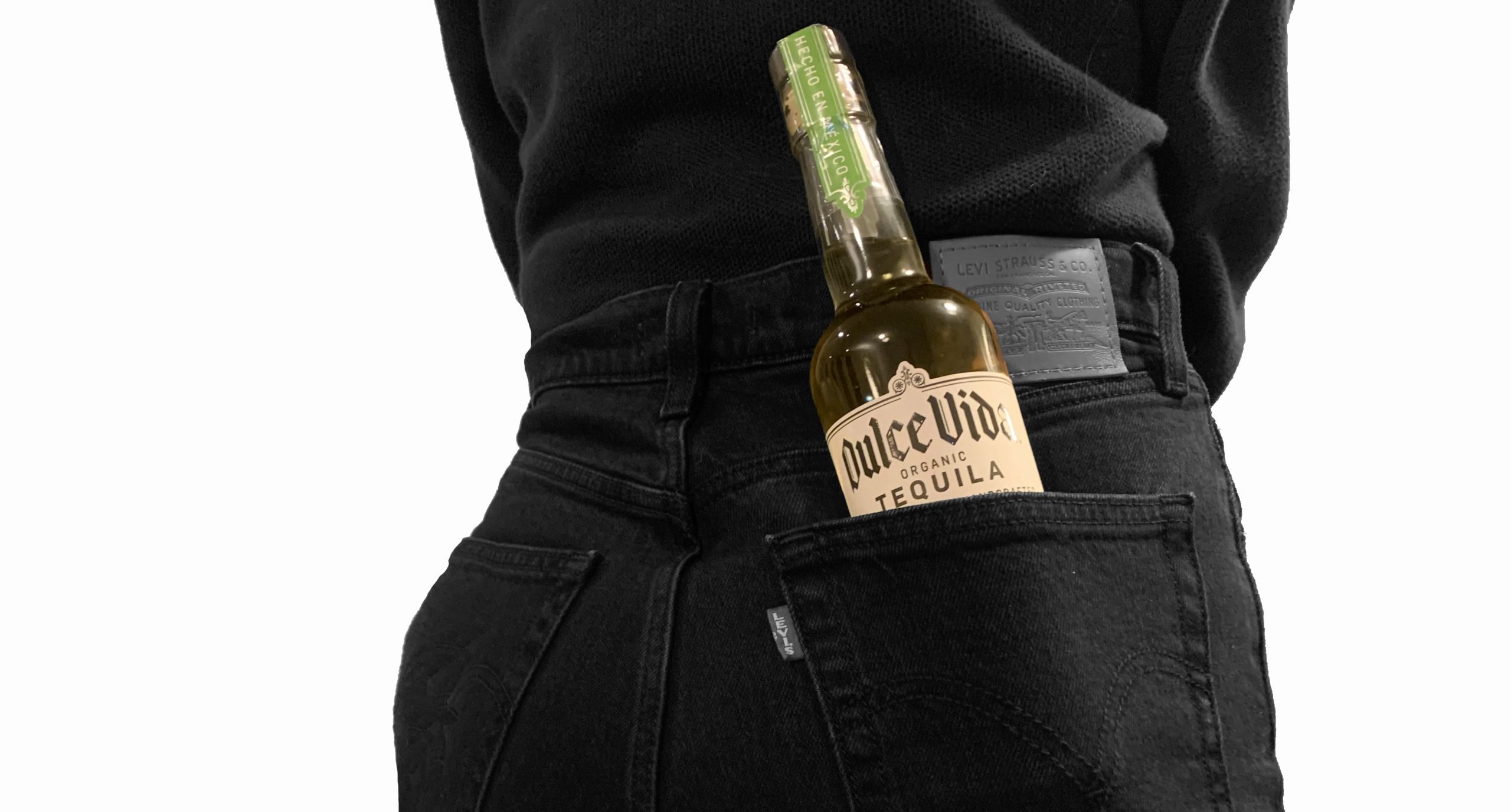
Reposado is Spanish for “rested,” an apropos description of Dulce Vida’s signature tequila that has been laying at rest in American Oak whiskey barrels for anywhere from 9 to 11 months. The Dulce Vida Reposado has a light honey color—not unlike a Mexican beer—and brings forth a refreshing aroma of fruit with hints of apple, caramel and citrus. Kudos to Dulce Vida for making a Reposado that goes down easy with mild burn and a dash of sweetness that lingers in your mouth.
11. Villa Lobos Extra Añejo
Retail Price: $119.00 / 750mL
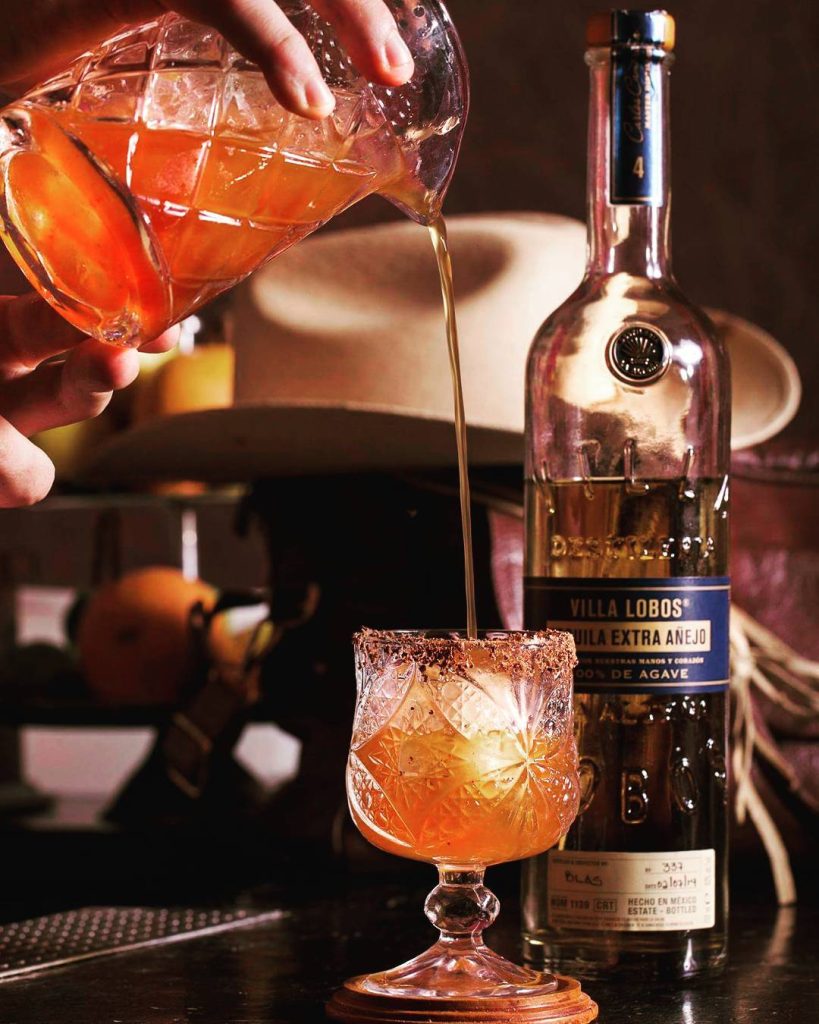
This small batch tequila from the highlands region (Los Altos) in Jalisco offers a rich, honey-colored elixir with a decidedly bold character. The agave mixture retains hints of barrel with a citrusy tingle that lingers in the back of the throat. It’s mild for sure—even a bit on the sweet side. No need to mix this tequila with anything much more than a spritz of lime and a few cubes of ice, but make no mistake about it—it makes a great additive to a pomegranate margarita.
12. Milagro Select Barrel Reserve Añejo
Retail Price: $83 / 750mL
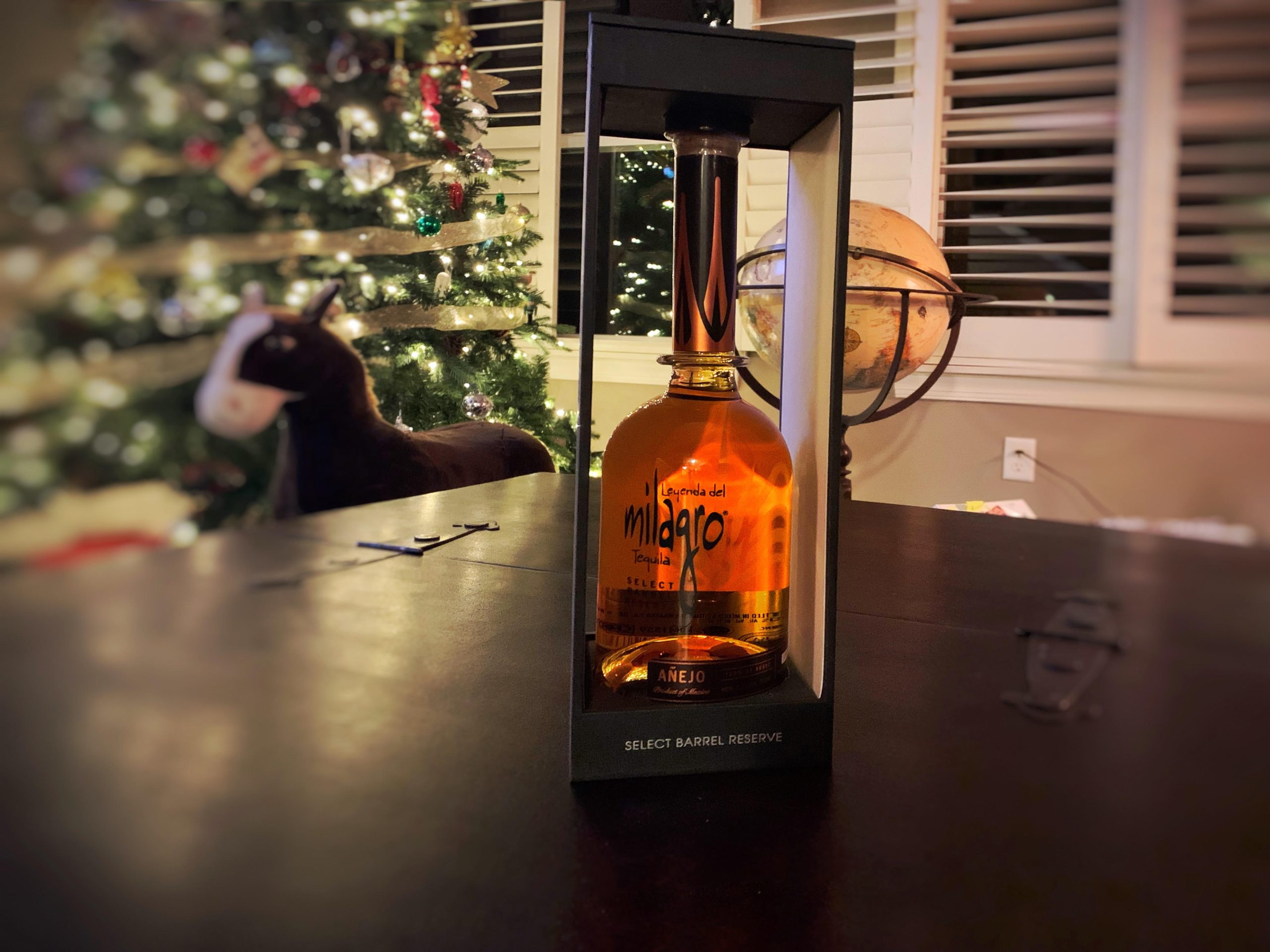
Looking for a Christmas miracle or some extra holiday sizzle? Look no further than Leyenda del Milagro Select Barrel Reserve Extra Añejo. This blue agave tequila is aged in American and French oak barrels for a minimum of 14 months, which gives it this distinct amber coloring. The palate detects hints of vanilla, caramel, chocolate and butterscotch. It finishes with strong, dry notes of oak. The Milagro Select Barrel Reserve Añejo won gold back at the 2017 San Francisco World Spirits Competition, and it has since gone on to become a bartender’s favorite at high-end watering holes.
13. Hacienda de Chihuahua H5 Sotol Extra Añejo
Retail Price: $139.99 / 750mL
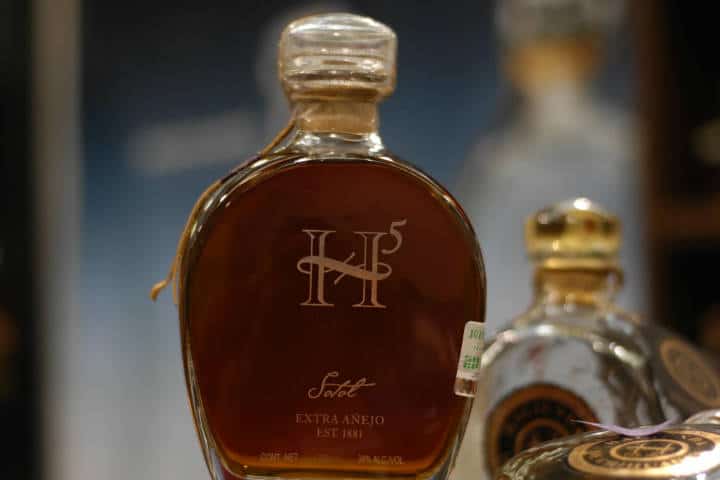
Sotol is one of the up-and-coming agave competitors that comes from the Mexican northern border state of Chihuahua. It is made from an organic agavaceae, a wild-harvested agave that grows in the Chihuahuan Desert. Hacienda de Chihuahua’s premium H5 Sotol Extra Añejo is the brainchild of master distiller José “Pepe” Daumas Gil de Partearroyo, who received his master’s degree in enology at the world renowned École Nationale Supérieure Agronomique de Montpellier and has worked with brands such as Moët & Chandon. Partearroyo’s special process—the exact recipe is a closely guarded secret—involves slow steam cooking the wild-harvested plants, then naturally fermenting them with champagne yeast. From there, his froth is moved to French white oak barrels for up to at least five years. Its flavor is smooth and succulent and could someday give tequila and mezcal a run for their money.
14. Casamigos Añejo
Retail Price: $58.79
George Clooney and Rande Gerber started Casamigos in 2013 based on their love of sharing tequila at their neighboring houses in Cabo San Lucas, Mexico. What began as, at most, a passion project for the mega-actor and Mr. Cindy Crawford would continue to grow into a company that would later be bought out for over a billion dollars by British multinational beverage company Diageo. One side effect of this deal was that it seemingly opened the floodgates to an endless barrage of celebrity-endorsed tequila brands. While Clooney may not be at the helm of his company anymore, the original reasons for the success that Casamigos found are still present in their spirits today.
Casamigos Añejo sources its Blue Weber agave in the nutrient-rich soil of the Highlands of Jalisco, Mexico. Once the agaves have matured after seven to nine years, they are taken to bake in traditional brick ovens for 72 hours and undergo an 80-hour fermentation process. The Casamigo master distiller uses a special proprietary yeast blend and ages the Añejo for 14 months in premium American white oak barrels. The final product is one that delivers measured notes of caramel and vanilla with a flavor that balances the sweetness from the agave with hints of spice and barrel oak.
15. Cutwater Tequila Añejo
Retail Price: $49.99 / 750mL
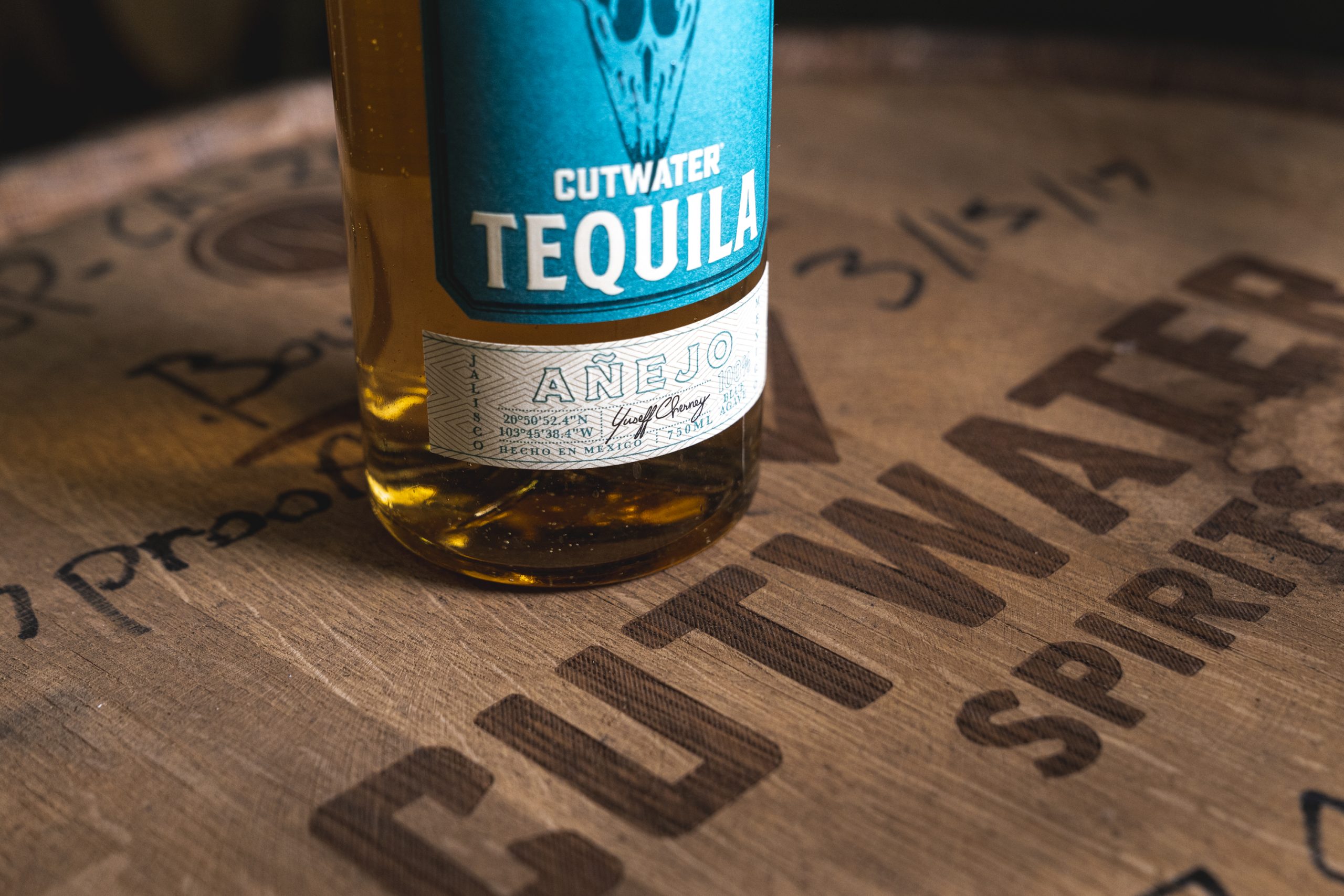
Cutwater Tequila Añejo comes off the heels of Cutwater’s extraordinarily successful Reposado, which was awarded Best of Class and Double Gold at the 2020 San Francisco World Spirits Competition. While those are big shoes to fill, it should go without saying that anything released by the folks at Cutwater is bound to be top notch and worthy of your attention.
Somewhat of a traditionalist in its production, the Cutwater Añejo uses blue agave hearts sourced from Jalisco, Mexico which is slow cooked in traditional brick ovens within the Cutwater Hacienda. The agave is then open fermented and double distilled in traditional “alambique” stills made of stainless steel and copper in Tequila. Cutwater whiskey barrels are used in the aging process, which melds the rich cooked agave flavor with vanilla and oak. Enjoy on the rocks or neat.
16. Mijenta Tequila Reposado
Retail Price: $69.00 / 750mL
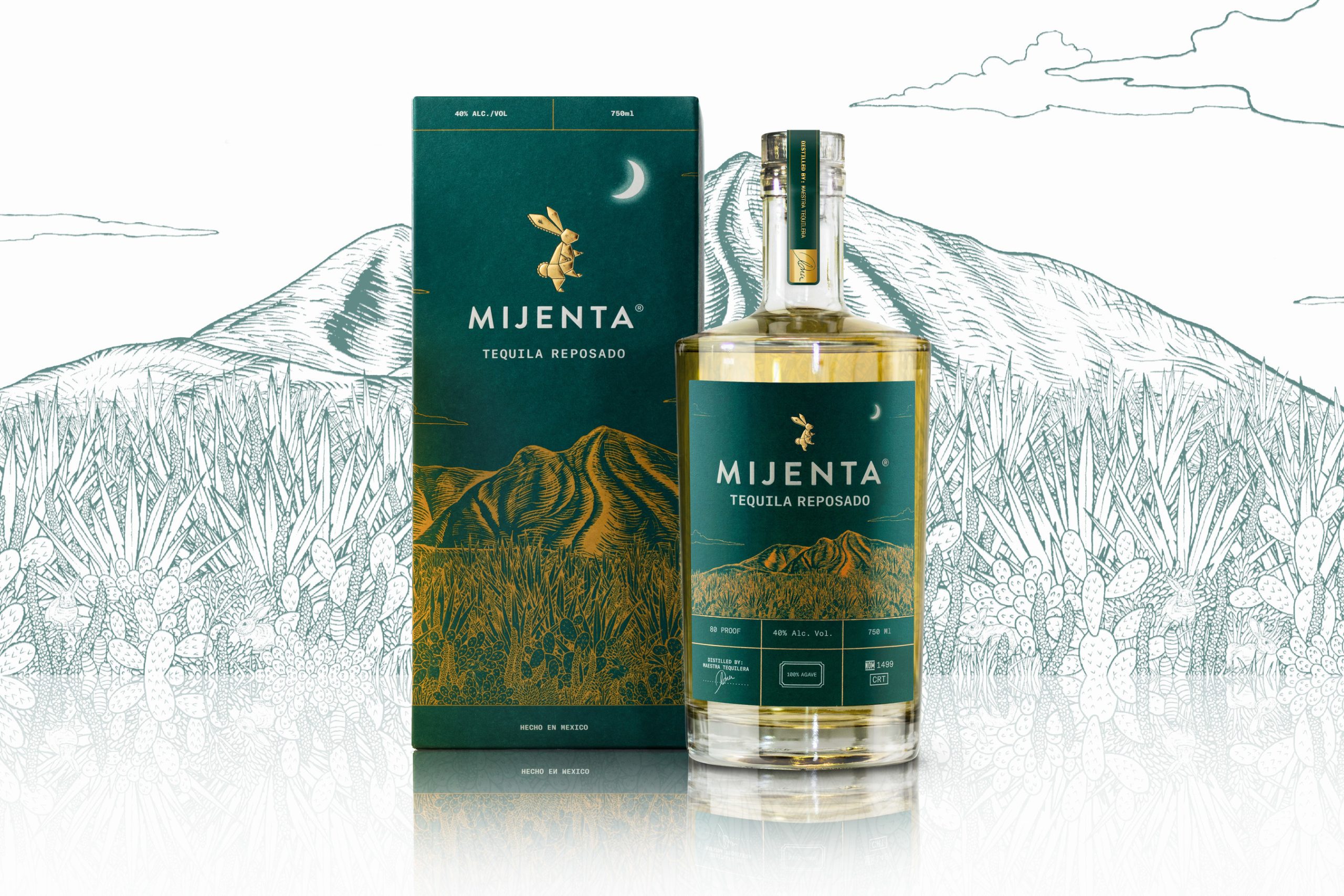
The newest member of the Mijenta Tequila family, the Mijenta Tequila Reposado, was just launched this December and is set to be one of our favorites among the more affordable Reposados of the year. Mijenta also brings socially forward positioning to the agave marketplace; the company is carbon neutral and has injected sustainable practices into every facet of production. (Even the waste of the agave used in making the tequila is recycled into Mijenta’s packaging.) Many proceeds from the sales of Mijenta are directly reinvested into services offering health care assistance and education development for the Mijenta team and their families.
Mijenta’s team of dedicated jimadores harvest fully matured Blue Weber agave from red-soiled plots of land dotting the Highlands of Jalisco. The high elevations, nutrient-rich soil and meticulously slow distilling process produces a smoother tequila with quite a bit of fruitiness. A nose of vanilla and fruit with a palette of honey, vanilla, cherry, pear and orange await its drinkers. Only 6,500 bottles will be produced in the first batch, so supplies are limited.
17. Clase Azul Día de los Muertos
Retail Price: $2,299.99 / 750mL
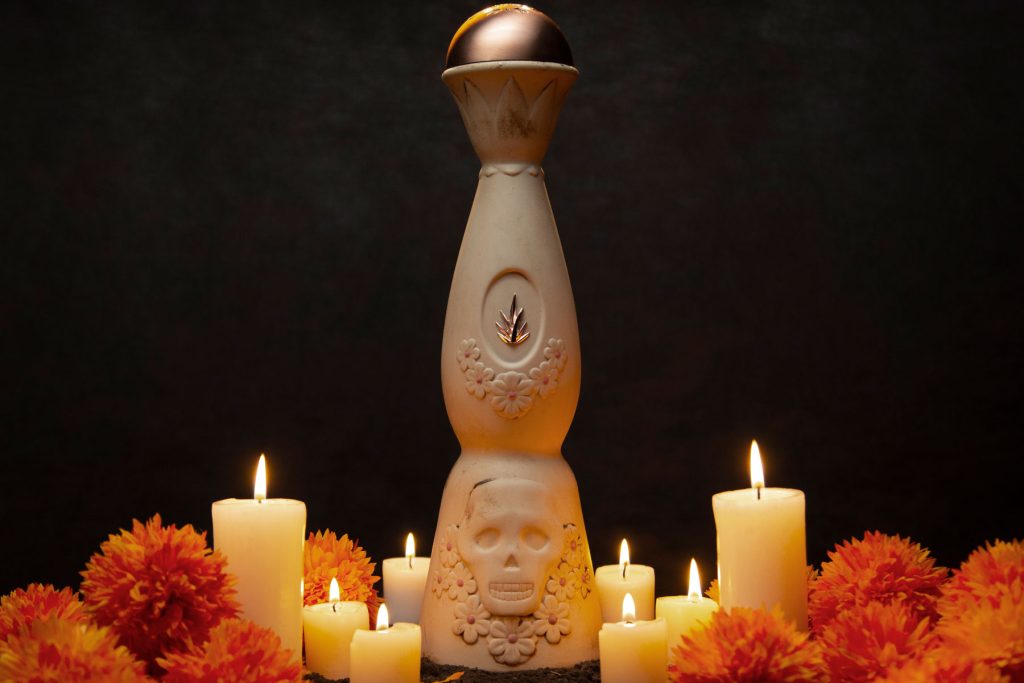
Even if looks could kill, we would still risk it for the Clase Azul Día de los Muertos Tequila. Clase Azul released this limited-edition batch of agave in an iconic bottle that truly captures the spirit of the famous Mexican Day of the Dead national holiday. With only 2,000 bottles available, good luck getting your hands on one—at least at the listed MSRP. Clase Azul Día de los Muertos mixes its classic Plata and Reposado tequilas with the Clase Azul Ultra (see #1 on our list), delivering a deliciously complex blend with fragrant aromas, a golden hue and a silky, fulsome finish. More than the tequila itself, what we really love is the handcrafted bottle designed to reflect the holiday’s traditions and symbolism. The bottle is inspired by bones, “meant to commemorate communication with the spiritual world,” and adorned with marigold flowers and skulls. Not exactly Christmassy, holiday-friendly symbolism, but heck, this is 2020, so why not?
18. Los Arango Reposado
Retail Price: $49.99 / 750mL
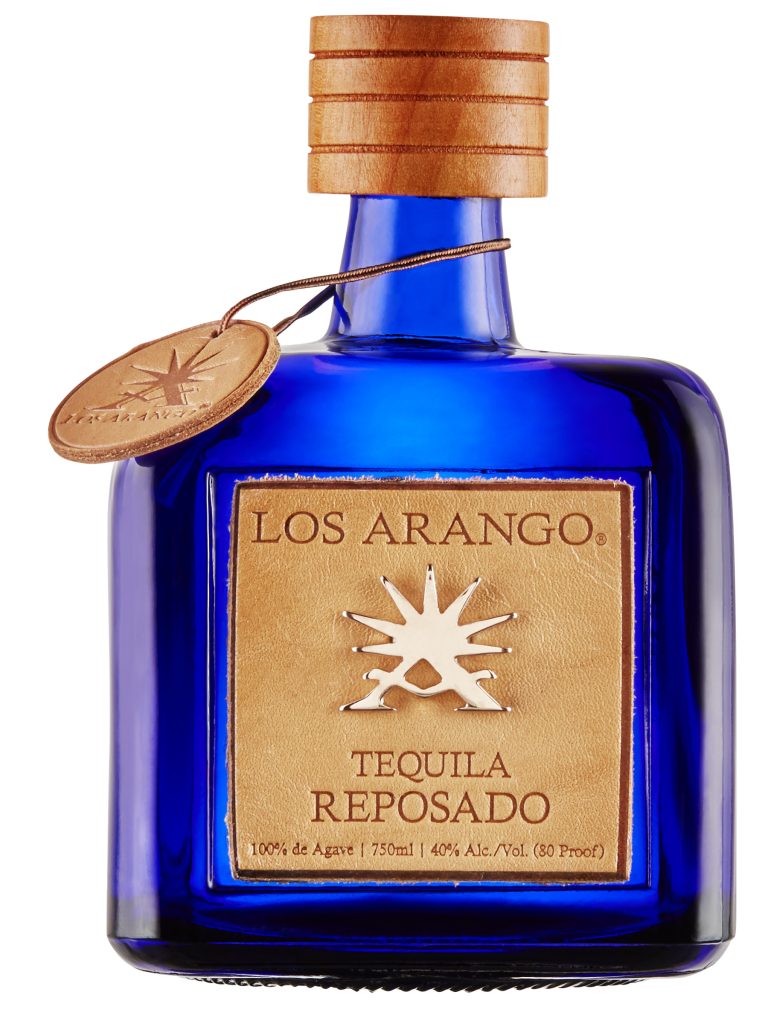
With its leather metal spur label, Los Arango Reposado is one tequila not to be messed with. The Arango brand is one rooted deep in Mexico’s history; its name honors the revolutionary Pancho Villa, né José Doroteo Arango, the legend who fought against tyranny in the Mexican Revolution.
Los Arango is a slightly sweet, blue agave tequila that is produced in Pénjamo, Mexico. Along with it being a contender for best looking bottle on the list, this fine distilled agave nectar is cooked by clay ovens and fermented with a specialty yeast strain. It is double distilled and then aged for six months in American oak, before being bottled into blue blown glass. It’s a tradition to toast the successes of the Mexican revolution with your first sip of Los Arango. ¡Viva La Revolución!
19. Espolón Añejo X
Retail Price: $110.00 / 750mL
The X is for “extra.”
The Espolón Añejo X has all of the desirable qualities one could want in a tequila. Bottled in glass that looks like it could sit on a stand in a museum, the craftsmanship is a mix of designs inspired by famed Mexican artist José Guadalupe Posada who used images of death and the macabre as motifs throughout his life’s work, as well as being inspired by the Oaxaca-based tradition of barro negro Pottery.
Even if Espolón Añejo X was bottled in a clay jug, it would be worthy of a spot on any home bar wanting to bring their collection to the next level. Every batch of Espolón Añejo X is a one-of-a-kind, extra añejo that contains notes of prominent vanilla and caramel, spiced nutmeg, bitter chocolate and fruit. If you get your hands on a bottle of this special elixir, you’ll want to save it for an extra special occasion.
20. Próspero Tequila Añejo
Retail Price: $52.97 / 750mL
https://www.instagram.com/p/CIAndFCHrv5/?utm_source=ig_embed
UK songstress Rita Ora has made Stella Anguiano, arguably Mexico’s most distinguished female master distiller, an international celebrity in the tequila world. Próspero is a handcrafted spirit that offers a smooth and perfectly balanced finish. Great care is taken throughout the Próspero production process to ensure that each bottle reflects Anguiano’s spirit—inside and out. Every element is crafted by hand—from the elegant bottle and the perfectly balanced liquid to the artistically illustrated label that is a symbol of female empowerment.
In Ora, Próspero found an international brand ambassador who is driven by a commitment to maintain the same process and quality that comes from family tradition—doing things slowly, with patience and with passion. Próspero is a celebration of women; a spirit made with all women in mind. “Women are here. We see women in all areas of the industry…bringing our knowledge, our desire to succeed and especially our passion to do things well,” says Anguiano.
21. Patrón Añejo 10 Años
Retail Price: $349 / 750mL
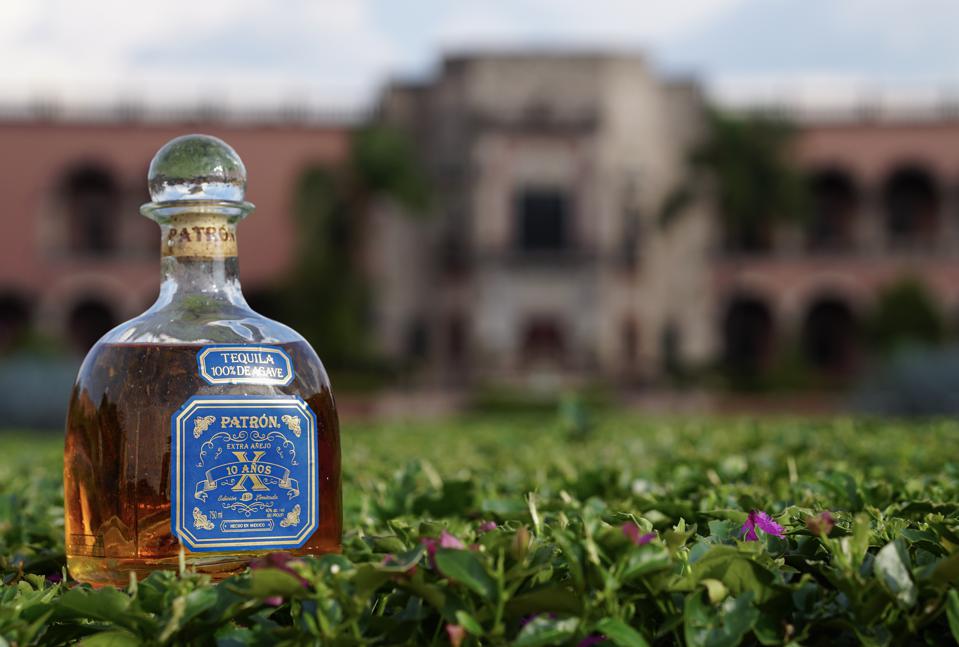
Potentially the most recognizable brand name on this list, Patrón’s first entry into the world of premium, aged tequilas might have tequila-hipsters rolling their eyes, but the Patrón Añejo 10 Años stands tall amongst its competitors as a quality, balanced, clean agave spirit.
Distilled in Jalisco, the Blue Weber agave tequila is aged in American oak barrels and American/French Limousin oak for 10 years before bottling; it’s the oldest tequila produced at the Hacienda Patrón distillery. The vanilla and fruity aromas entice consumers with a balance of spice, nut and a hint of wood. Patrón Extra Añejo 10 Años is only available in the United States.
22. Don Julio 1942 Añejo
Retail Price: $829 / 750mL
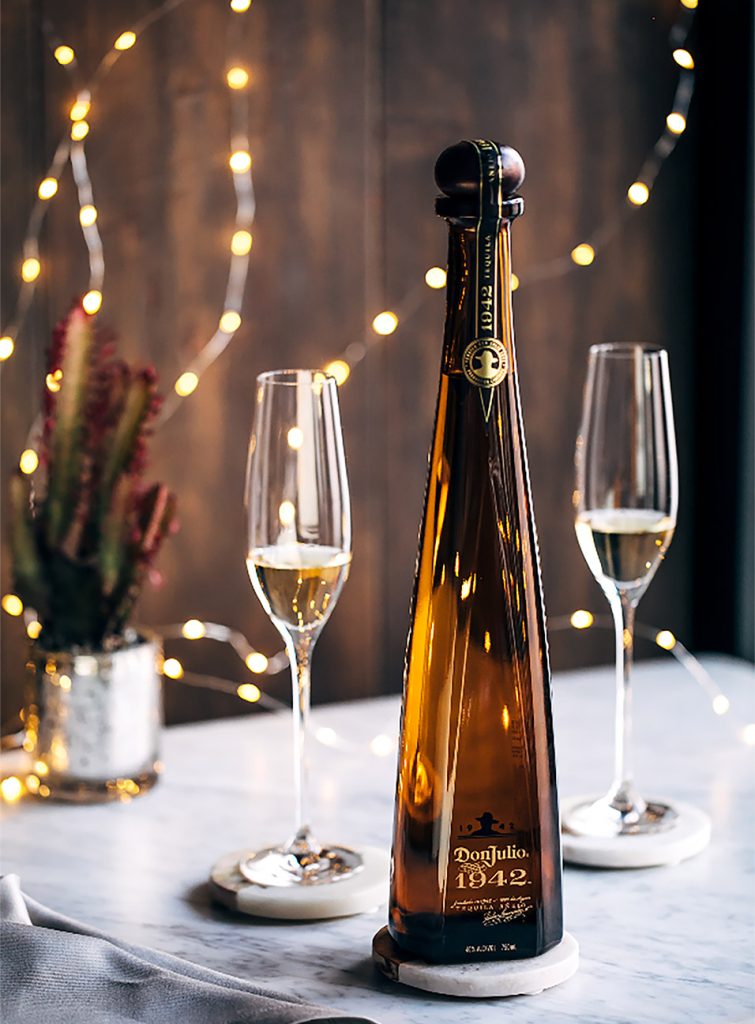
Debuting in 2012, the Don Julio 1942 Añejo can be recognized by the famously slim-figured glass it’s bottled in. According to legend, when he first began distilling tequila in 1942, Don Julio González-Frausto Estrada, then only 17 years old, noticed that families would place tequila bottles that were too big on the ground, as they were often obstructive—too big to have on a table or bar without blocking the line-of-sight. His pride for making sure his tequila was not banished to the floor led him to design a bottle that could easily rest upon on a table without obstructing the view.
Aged for two-and-a-half years in used American oak barrels, the Don Julio 1942 is a subtle combination of dry earth and sweet candy, and finishes on the palate with hints of mint, cinnamon and caramel, accompanying its creamy finish. Serve Don Julio 1942 on the rocks or neat. It’s too good to mix.
23. Avión Reserva 44
Retail Price: $125 / 750mL
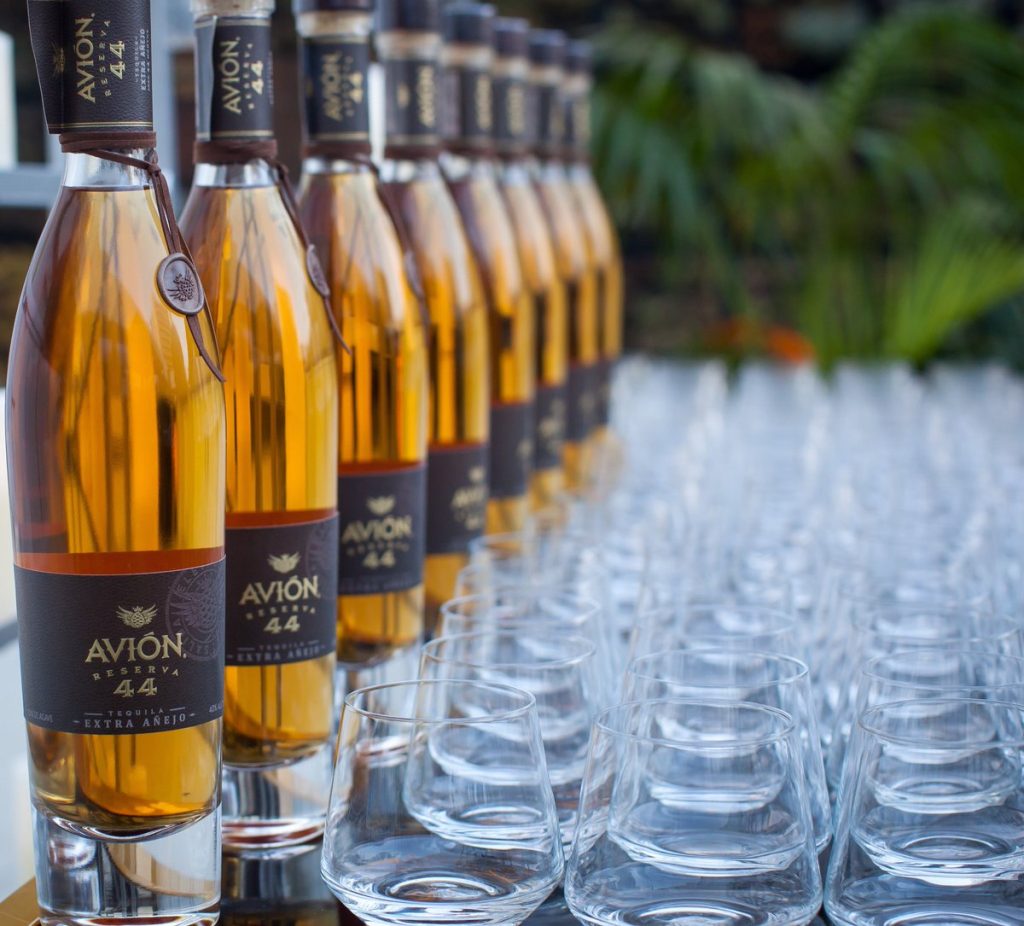
A favorite of boxer Floyd Mayweather, the Avión Reserva 44 Extra Añejo begins its journey in Jesus Maria, Mexico, at 7,200 feet above sea level. The agave is slow-roasted and eventually distilled through Avión’s custom, uber-slow filtration process. After 43 months aging in oak barrels, the Reserva 44 is aged another month (hence the 44) in specially crafted, petite barrels that are twirled daily. To hear about Avión’s distillation process makes it sound like a pseudo-religious experience, but that zen-like patience and precision by the folks at Avión quickly pays off as soon as this magical elixir touches your lips, making it a staple on top-shelves around the world since its debut. The tequila is a lovely blend of fruit and American oak, and is sold when limited batches are available. Forget about paying the MSRP.
24. Casa Noble Alta Belleza
Retail Price: $1,200.00 / 750mL
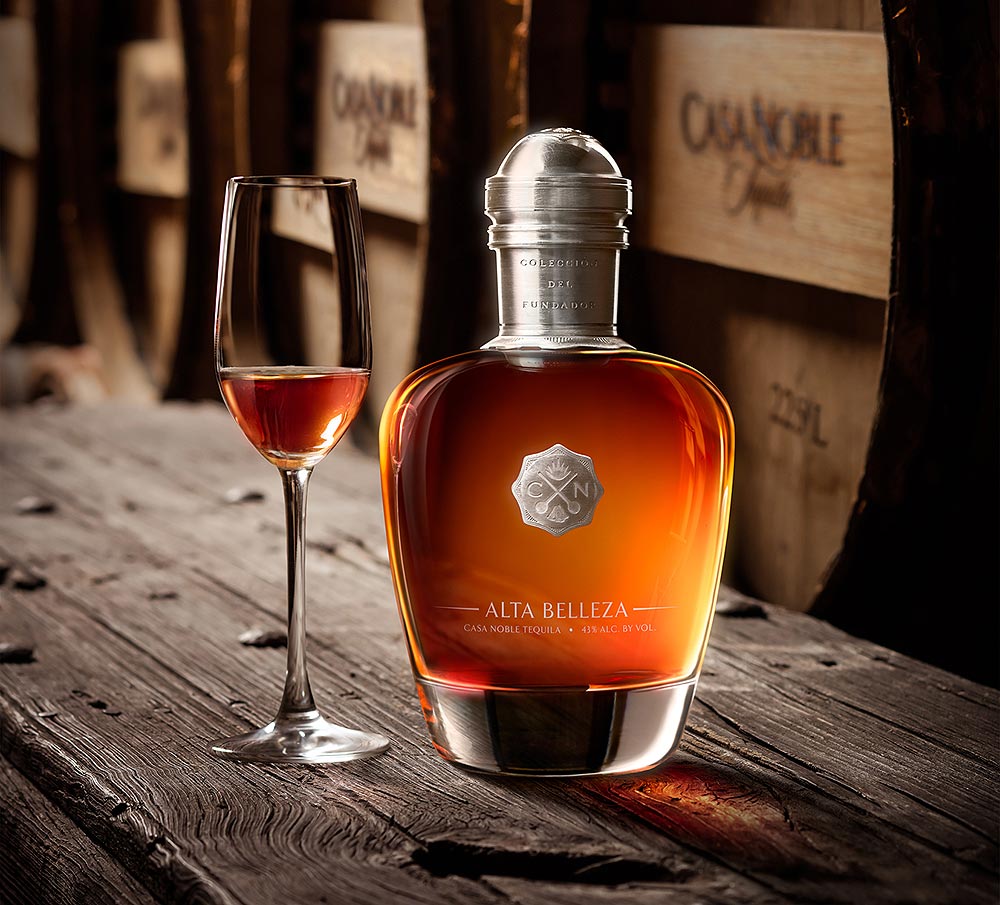
The superior Alta Belleza begins with Casa Noble’s industry-leading Single Barrel Extra Añejo, which is triple distilled and aged slowly to perfection in new French white oak barrels. But Casa Noble then takes this fine tequila one step further, giving it another six months in T5 Tonnellerie Taransaud French oak wine barrels that were used to age world-renowned Robert Mondavi Cabernet Sauvignon. The result is a Mexican Michelangelo in a bottle.
Casa Noble’s expertise stems from seven generations of distilling the spirit on an almost personal level. Each bottle of Casa Noble is distributed in individually numbered bottles signed by Pepe Hermosillo, maestro tequilero and founder.
The Alta Belleza offers a sweet and bright taste that is easily traced to the Cab wine barrels where it spends its final months. Aromas of green apple and spice complement notes of cinnamon and toasted almond, which gives Alta Belleza an unrivaled taste.
25. Ritual Zero Proof Tequila Alternative
Retail Price: $26 / 750mL
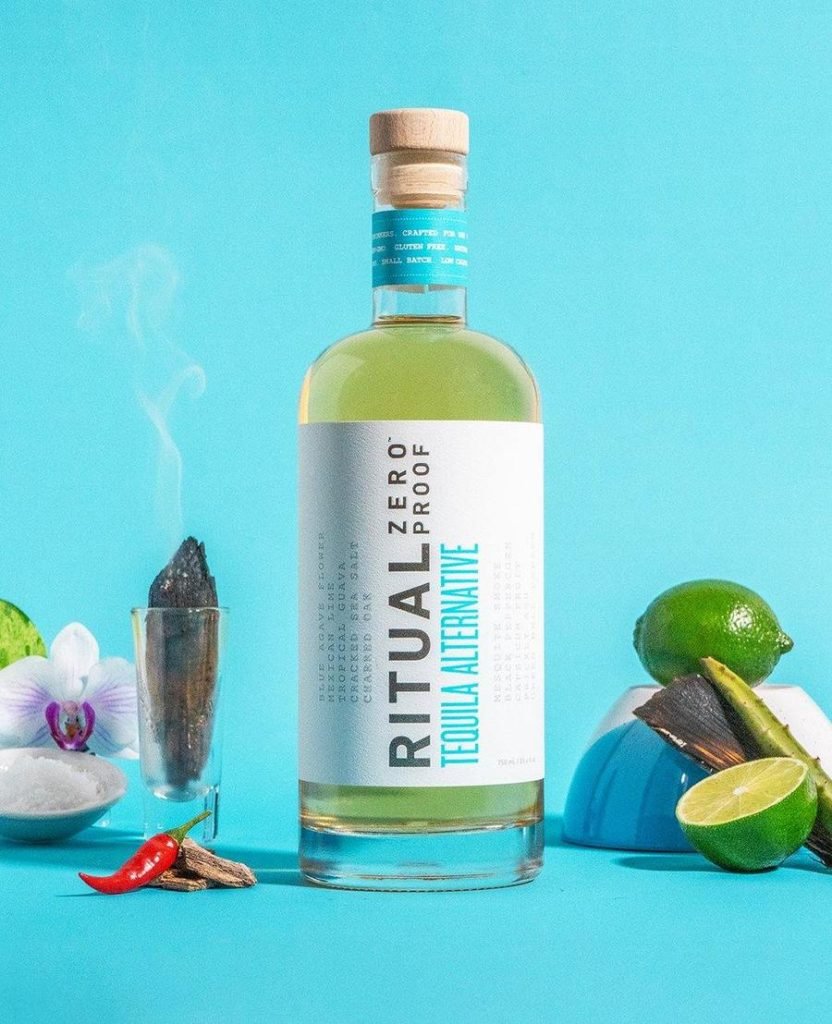
No list of spirits in 2020 would be complete without a non-alcoholic alternative, and for this designation, we chose Ritual Zero Proof Tequila Alternative.
Ritual Zero Proof Tequila is the primo non-alcoholic, spirit alternative on the market. Designed for mixing, this dry spirit keeps the taste, smell and burn of regular tequila, while getting rid of the carbs, calories and alcohol. The blended essence of Mexican blue agave and American oak botanicals produces a complex burn that simulates the mouthfeel of your typical alcoholic tequila. The batches are microfiltered to eliminate minute impurities, and every bottle is stamped for proof of freshness. The result? A perfect sweet and smoky addition to any bar worth its rim-salt.
26. Gracias a Dios Espadín Mezcal Artesanal
Retail Price: $53 / 750mL
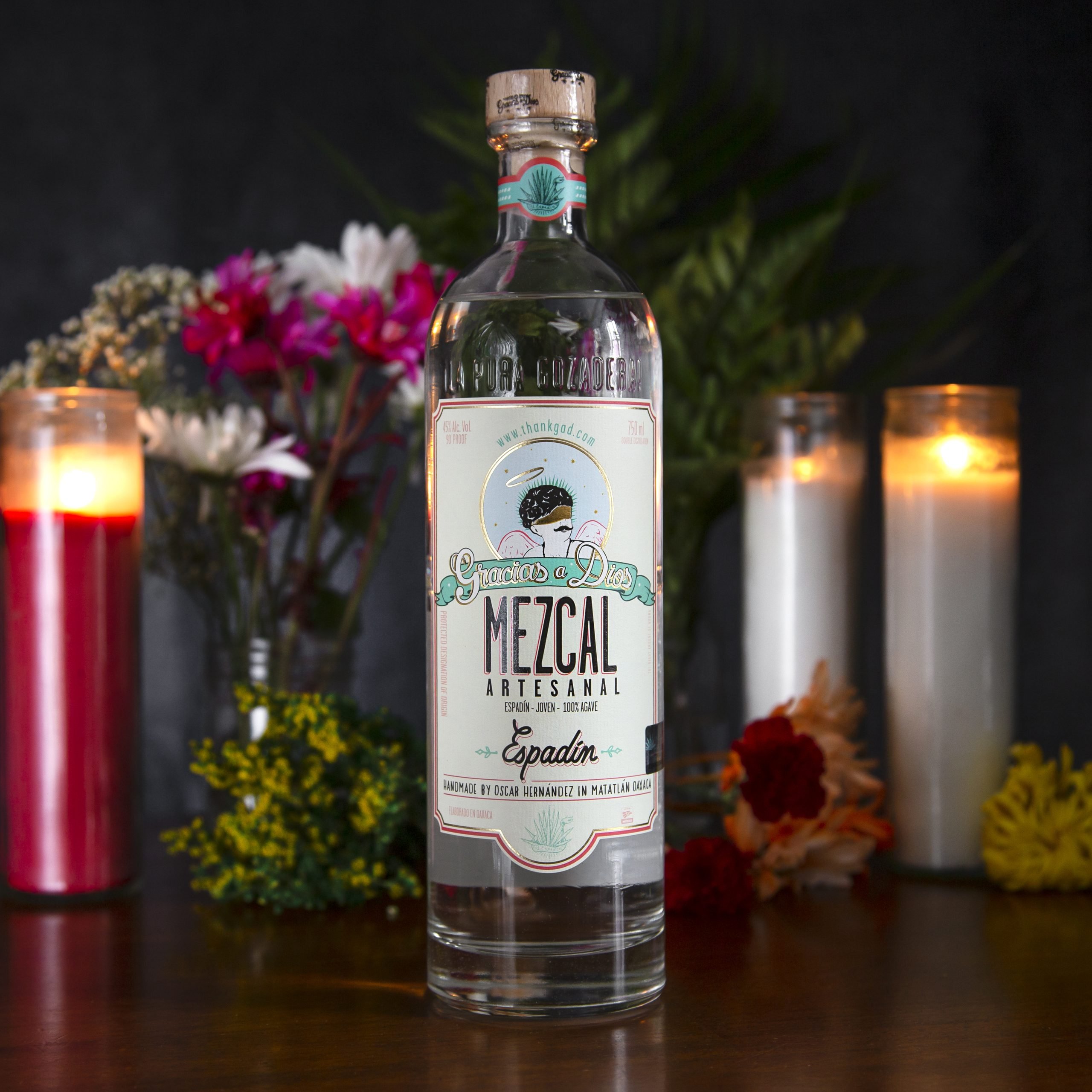
Gracias a Dios Espadín Mezcal Artesanal is a fantastic mezcal. Its smoky, dry flavor can be attributed the various Espadín and other agave piña varieties used in its assemblage. The mezcal is fermented at the Gracias a Dios palenque located in Santiago Matatlán and then distilled in copper by maestro mezcalero Oscar Hernández Santiago.
Outside of the tequila production, the team at Gracias a Dios takes pride in its conservancy activism, with about 2,200 mesquite trees being planted each year, with an expectation to plant 10,000 trees from 2020 and on. Gracias a Dios also contributes to its local community by donating adobe blocks made from the maguey and tree waste, which can be used for construction material. The company also provides their employees with 25 percent above the standard daily salary in Matatlán, as well as insurance, hot water and dorms for their workers.
The Gracias a Dios flavor opens with a slight smokiness and spice that’s followed by a fruity flavor, finishing dry and spiced. It can be enjoyed as a mixer, on ice or neat.
27. Dano’s Tequila Reposado
Retail Price: $53.00 / 750mL
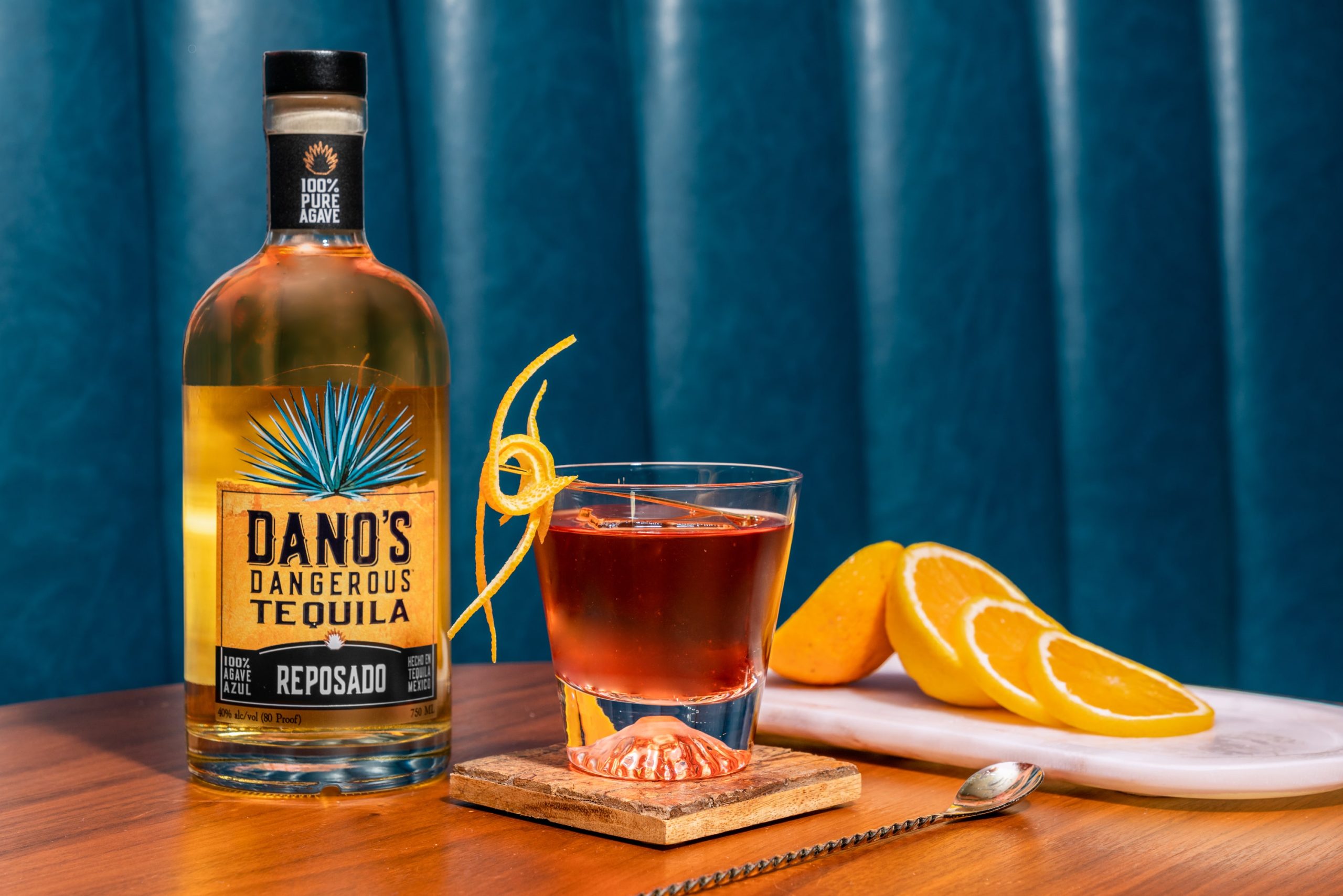
Dano’s Tequila’s Reposado is simple, effective, authentic and award-winning. No celebrity endorsements, no coloring added, no other ingredients besides Blue Weber agave and volcanic spring water. Piñas from 8-year-old Blue Weber agave are slow-steamed for 26 hours in an oven before they are milled by a tahona, a grinding wheel that separates the fibers from the juices. From there, the agave concoction is double distilled using only copper stills.
Dano’s Tequila’s Reposado is aged in virgin oak barrels, an unorthodox practice that puts Dano’s Tequila flavor profile in a class of its own. According to CEO Chris Timmerman, “this is a deviation from other tequila brands that use aged whiskey barrels, which can muddle the flavor of the tequila.” Its distinct flavor has earned medals in four of the largest spirit competitions in the world, including the SIP Awards in San Diego and the San Francisco World Spirits Competition. The Reposado’s taste profile consists of spiced peppers that are cooled down by vanilla, accompanied by a balance of pineapple and herbal agave.
28. Azulana Sparkling Tequila Original
Retail Price: $15.39 / 4 pack of 12 oz cans
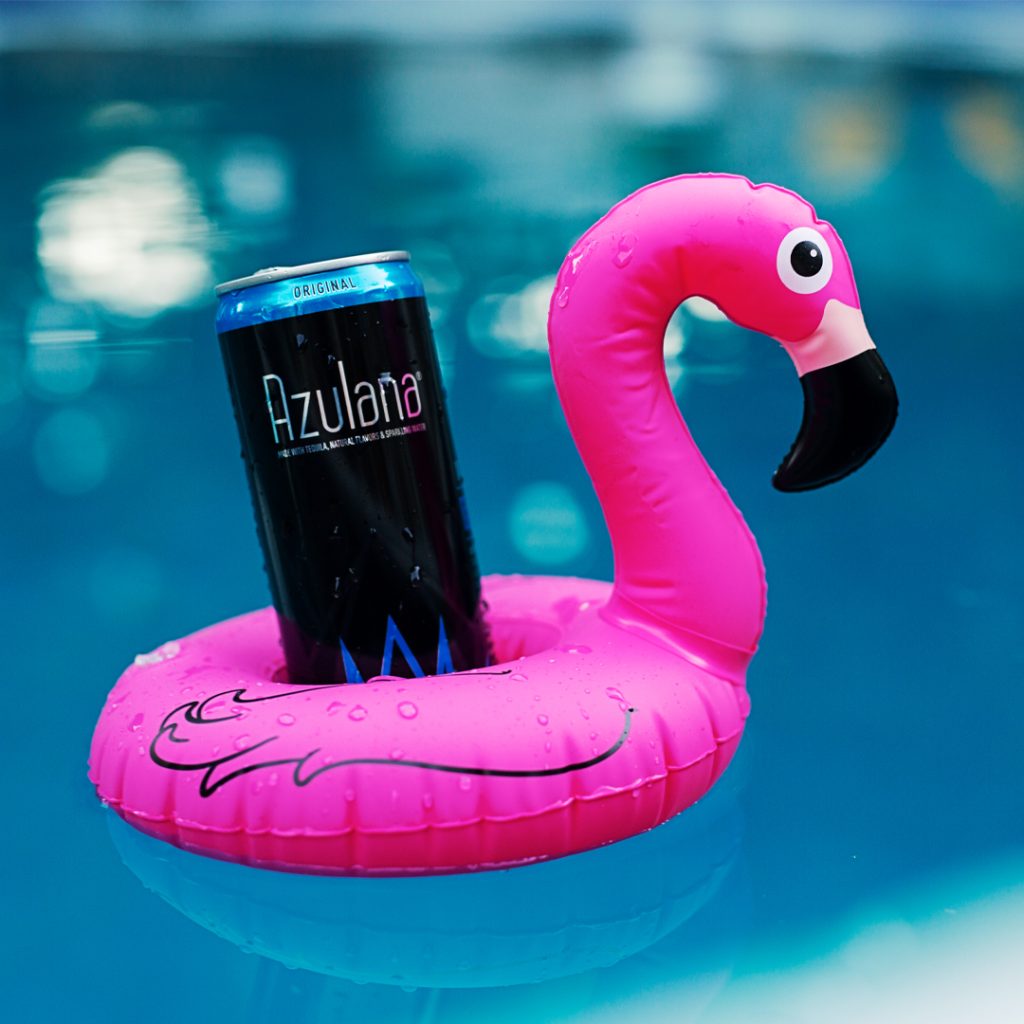
What could be better than tequila in a can?
If there was ever a legitimate candidate that could be the White Claw killer, we believe it is Azulana’s Sparkling Tequila. The canned cocktail is made with 100 percent blue agave tequila and sparkling soda and naturally sweetened with agave syrup. Produced in Jalisco, the canned tequila company originally launched out of Los Angeles in 2019 with a promise to donate 8 percent of their profits to non-profit initiatives supporting jimadors and their families living in Mexico. A more than worthy excuse to splurge on its three different flavors: Original, Lime and Pineapple Rosemary. Each can of Azulana Sparkling Tequila is gluten- and impurity-free.
Honorable Mention: Dos Cuernos Blanco
Retail Price: $39.99 / 750mL
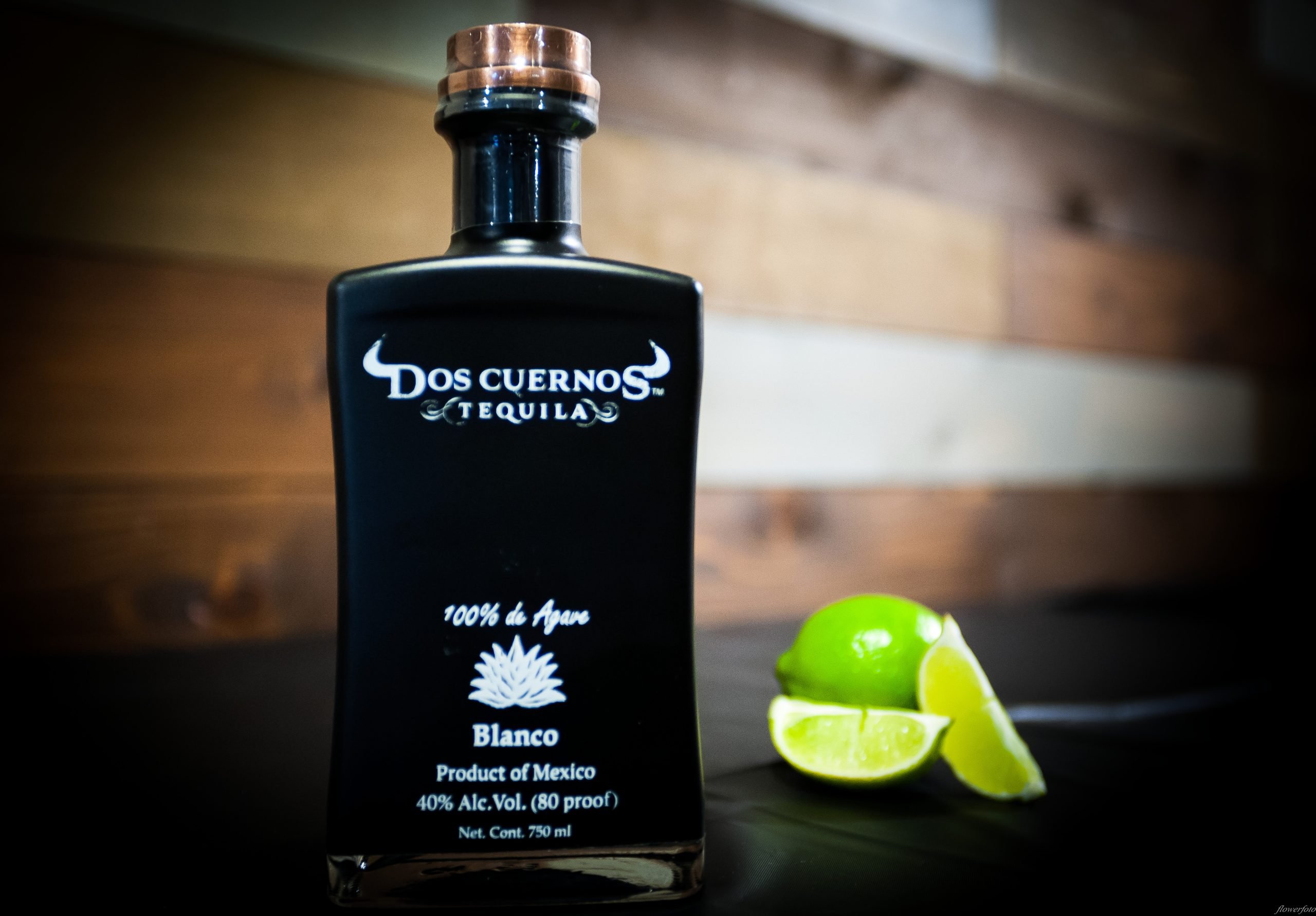
Dos Cuernos’ Blanco inaugural release was only made available in the Austin, Texas market, yet it sold out quickly—an auspicious start for this newcomer in the tequila game. According to Dos Cuernos partner Sylvester Palacios, “if your tequila can make it here [in] Austin, it can make it anywhere. Austin is the margarita capital of the world.” Based on the record-fast sellout of their initial Blanco batch, demand is already peaking for the brand’s second Blanco release slated for later this year, as well as a forthcoming Reposado.
Despite being the new kids on the block, Dos Cuernos’s Blanco was anything but amateur, and thus deserving of an honorable mention in this list of holiday agaves. As soon as it hits your palate, you’ll get a sweet and slightly tingly agave flavor, followed by a peppery finish. The agave flavor at the beginning of a sip is the telltale sign of a master tequilero at work. Soon, it won’t be just Longhorn fans who will be able to enjoy this sultry newcomer.








